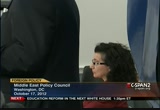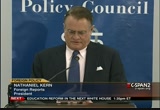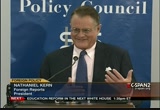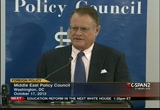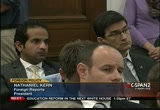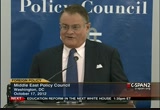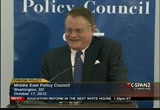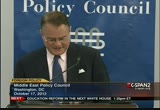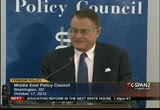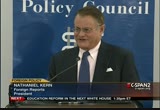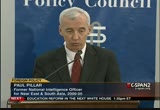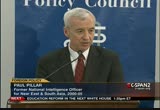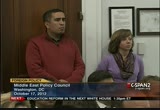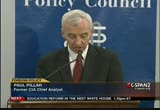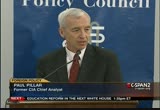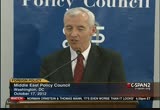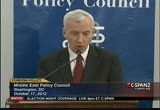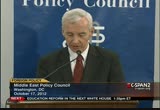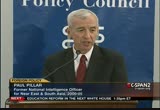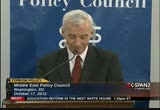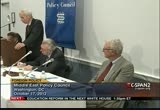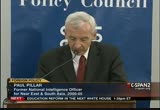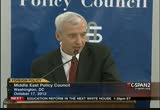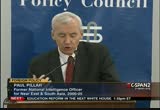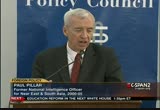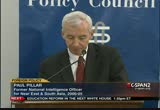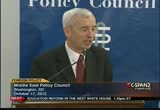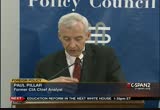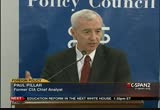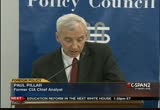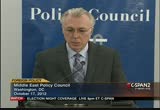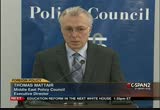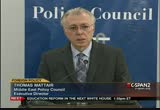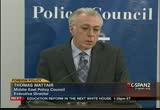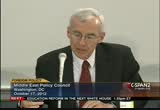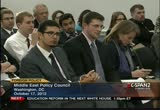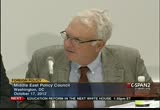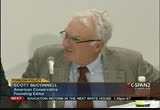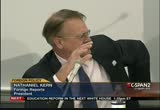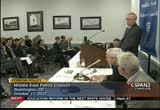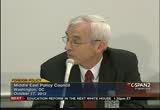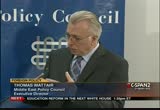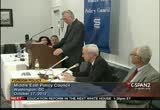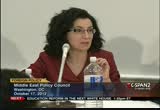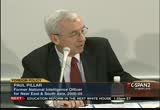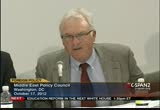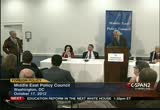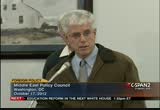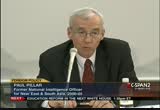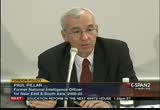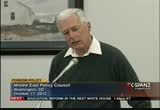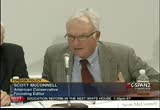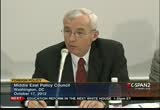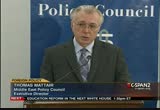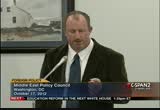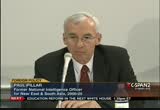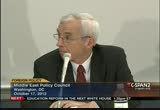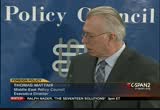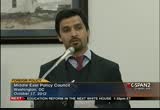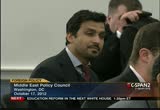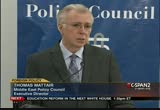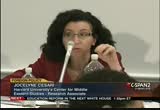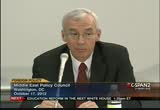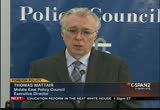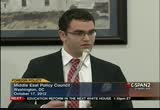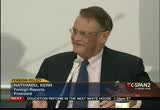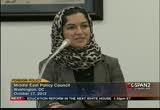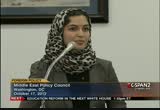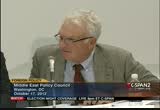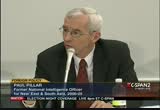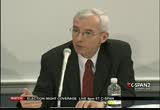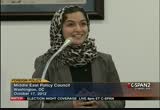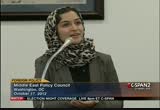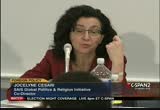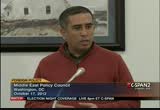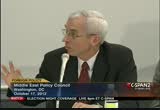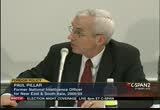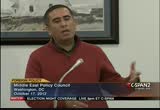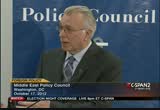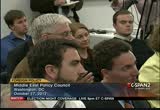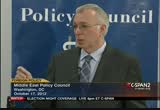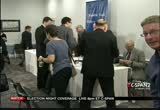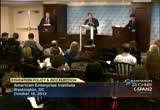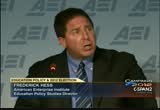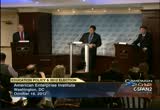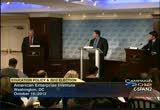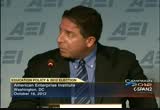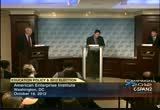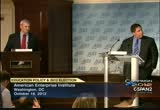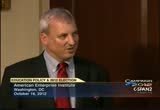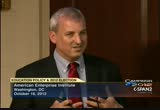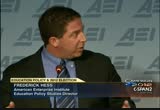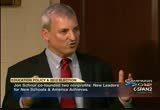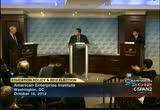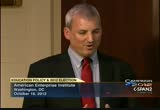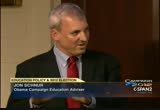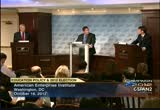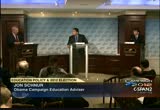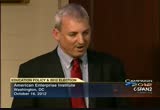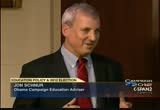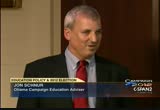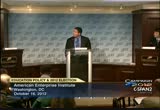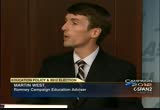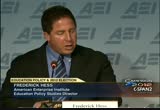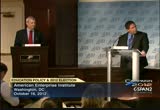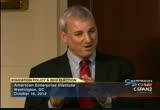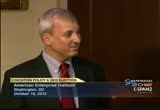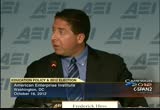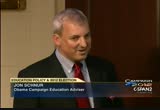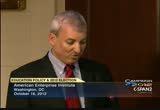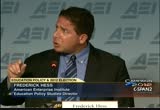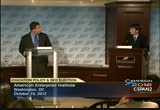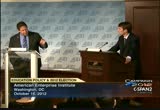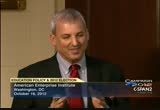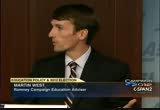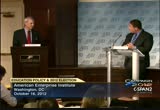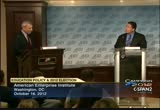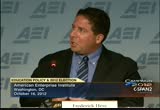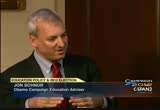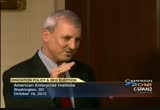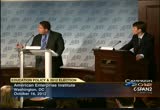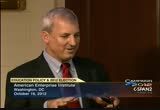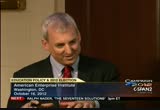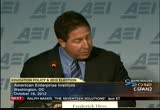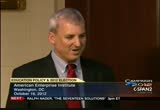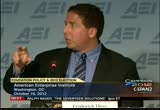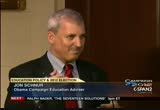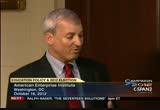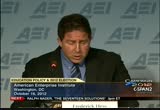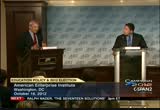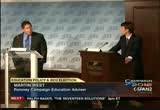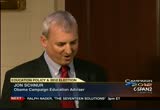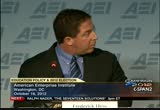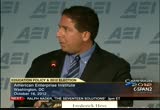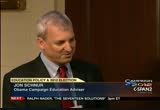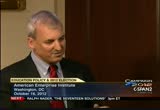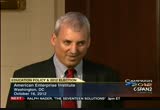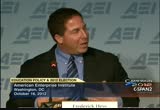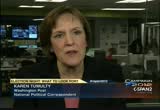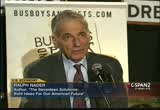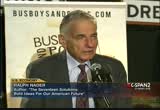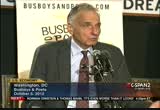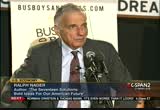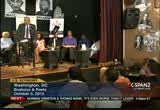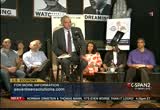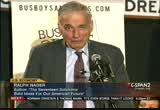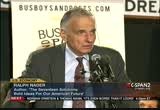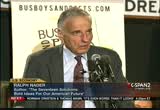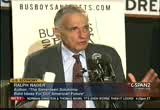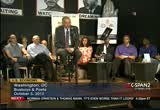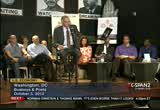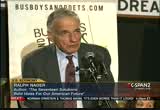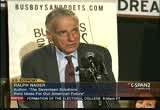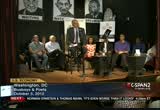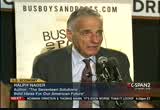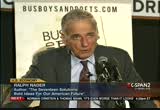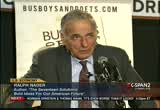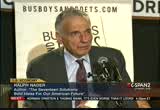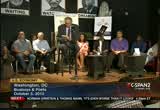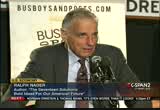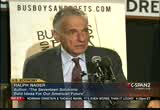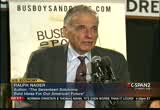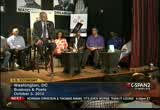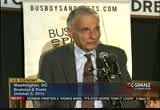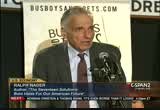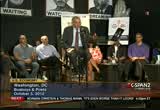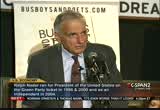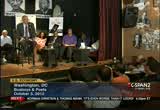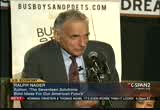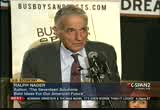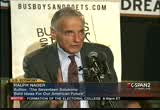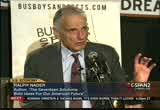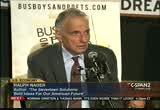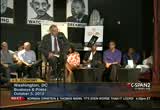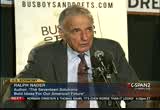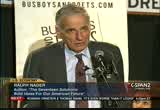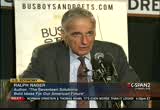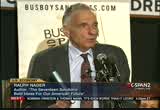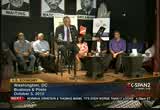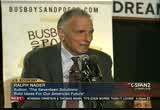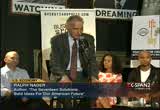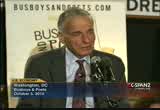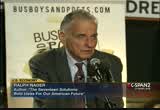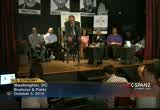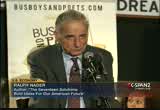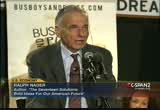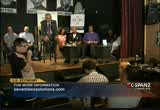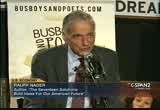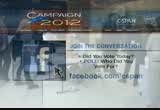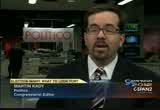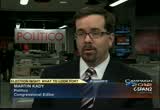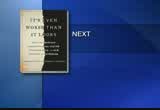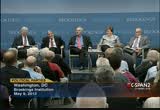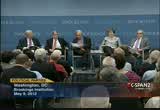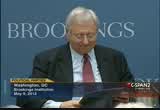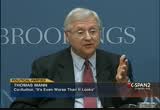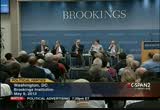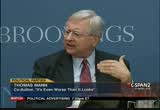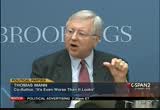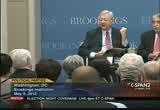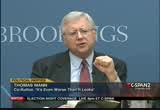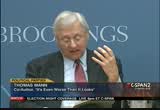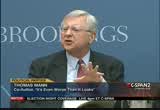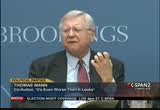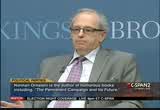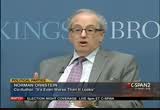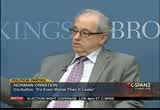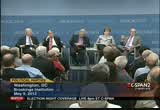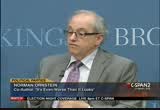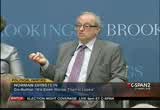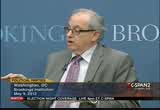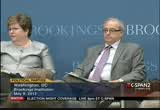tv U.S. Senate CSPAN November 6, 2012 12:00pm-5:00pm EST
12:00 pm
independent countries struggling with democracy and the economy. how do you go from a controlled communist economy to a free economy and make it work? what they have done is establish the european bank for development based on what the world bank did to help western europe and jay pap after world d japan after world war ii, and they basically provided capital funds plus the things we've all learned about how to do things right rather than wrong in building a new economy. ..
12:01 pm
12:02 pm
quite proactive and extending aid to egypt before and after morsi was elected, and i think it's important to understand what sort of things egypt needed right away was an ability to sell government bonds and treasury bills were because it takes about 14% interest which is pretty high for a government come and immediate deaths things look terrible. they came in and said okay. we will buy your one month issue of bills. a good payment unless the government defaults on everything. but that has helped relieve some of the interest pressure and try to move egypt out of the debt
12:03 pm
trap than greece or italy or spain. the second thing they have done is like the development bank there's quite good development banks that help identify the investment projects, make sure they are built without corruption and that they become effective. i think it is $4.5 billion that were qatar and saudi arabia have and christine was out there in september and they were working on a long program, very low interest rate and there would be another four and a half million or so but then egypt has a fighting chance to get an economy back on its feet. if you have an economy back on its feet then it's a little easier to talk about the division of resources.
12:04 pm
the resource base is going down the tube you are in a pretty desperate solution. again, they are starting to talk about doing this with yemen, too which is of course in an area of the u.s. and saudi arabia to cooperate a lot on counterterrorism, on the gcc initiative to get the power not only the thing is how do you get this desperately poor country running out of everything all but once given the chance to get back on its feet. we are still working together on that. the big issues you to brief the next secretary on our iran sanctions and syria. the imposition of the current set of sanctions wouldn't have been possible without such a
12:05 pm
deal last november but if the sanctions led to iran losing up to or a little more than half of its oil exports, with saudi arabia be willing to step in and make those exports and i think with a caveat that we probably can't make up all of iran's exports whether it be a mechanism to totally shut them down because that would take the saudi production right up and leave no spare capacity which tends to be a driver for the higher oil prices. so, as the sanctions have come about, we had some bumps in the oil market particularly in the spring in anticipation, but as they've been implemented i think
12:06 pm
we have at least a stabilization from where the prices are the lower rates won't and we are going to see what of the sanctions have an influence on the decision making will. to meet the bottom line is is iran really seriously willing to talk about giving of its nuclear weapons program i don't see there is a big problem in resolving the whole issue. if they want to prevaricate and have a situation where it is sort of talking about the nuclear weapons program and then the sanctions are probably going to remain until sometime or until some other situation arises. i don't think the next administration is going to have
12:07 pm
a terribly difficult time with saudi arabia one my or another. if diplomacy works, that's fine, they have full diplomatic relations and fully correct relations with iran. if it reduces an end to the iranian nuclear weapons program, if not there are different views and saudi arabia, and some feel very supportive of a military strike and others are a little more fearful of it. syria is in a state of limbo where they have been providing more arms to the syrian opposition, and i think it has been widely reported that the u.s. has said please hold off on providing the very effective missiles that can hit airplanes
12:08 pm
and tanks coming and we are still sort of in limbo with that and there's those more sophisticated weapons near the borders of syria that they are not getting to the opposition and syria. that's been a point that i think president romney has made that he would be in favor of working with them to ensure the syrian opposition gets the weapons it needs to hit the planes and tanks and as far as i know it is still tied up in the principles committee in terms of what actions we should or should not take with arguments. on the one hand we don't want these arms to go to people we don't know, dangerous people, and the other being if you leave us in place and he prevails what kind of world is that? , so those would be the big issues on the agenda. middle east peace process if
12:09 pm
there is something actionable that can be done, they would be very supportive of the moment and they want to get on with the rest of their lives as long as they can see this is a riddle that isn't going to be solved any time soon. the final issue would be oil market stability and that is an issue between the u.s. and saudi arabia since fdr first met in 1945. the u.s. didn't import any at the time, but for fdr and the 12 presidents that followed in a very simple formulation if you understand the size and the importance of the reserves, whether the u.s. needs to import or not, we don't want those reserves to fall into the hands
12:10 pm
or into the direct control of hostile elements whether it is the soviet union, saddam hussein or currently the ayatollah. the world would be very different if they held the oil resources in the gulf they would be able to control the world economy and that is something that again the past 13 presidents haven't wanted to contemplate so that would be the perennial issue on the table and it tends to buy the rest of the relationship. thank you. [applause] >> good morning. as the clean-up here we've been asked to address iran and syria which i will do not order which
12:11 pm
most of the attention diverted to the first of the topics and i would say on both of them there will be as we head into the new administration next year pressure on the u.s. president, whoever he is, to do more to get involved more on both of those issues but on each one it will either be no good choices for the administration to make or if there are at least reasonable quizzes that could be taken in would be politically difficult back here in the united states for the president, whoever he is to select them let's talk first about iran. there are many particularly useful departures, the u.s. administration could make with regard to iran, which would involve trying to improve the absolutely all of relationship that we have with the iranians and to get benefits where the u.s. and iran interests believe
12:12 pm
it or not parallel or intersect like afghanistan and one issue above all is the iranian nuclear program and that is because the agitation on this topic by the current leadership and the prognoses with regard to the likelihood, the likely outcome of that is that we will still have the prime minister netanyahu as prime minister even if there might be some adjustments in the ruling coalition. we might hope for the long-term prognosis to come true in which the issue of the nuclear program will necessarily be political
12:13 pm
fixation and continue to be one here in the united states. now an obvious constraint for either mr. obama or mr. romney as president beginning in january, 2013 they've repeatedly stated by both of them that a iranian nuclear weapon would be unacceptable, and of course there have them statements here on the hill by congress along the same sorts of lines that wouldn't necessarily have to be a problem given that there is no indication to date as our intelligence agencies tell us that iran has decided so far to build a nuclear weapon but certain aspects of the nuclear program particularly enrichment of uranium have come to be perceived in the the date as having a degree of on accepted devotee of their own and of
12:14 pm
course the israeli prime minister talks about this constantly to the red line and so forth and having the situation turn into a disaster for whoever's administration it is is a problem mainly of political constraints here in this country rather than any lack of negotiating space between iran and the p5+1 in the united states. he would have to have an agreement allowing some uranium enrichment probably at the no more than 5% level. the outline of the agreement are pretty clear. they would involve trading severe restrictions for the enrichment in return for sanctions relief. and we should bear in mind of the sanctions relief is the main
12:15 pm
reason that the iranians have to negotiate at all at this point. now on the first aspect about the 20%, there is stuff that needs to be negotiated, not just ending the 20% in richmond that's going on now but also what would be the disposition of the stockpile that iran already has and happily they have already helped resolve that problem by converting some of the fuel at that level to fuel plates were reactors where it is no longer usable to the further. there would also have to be a negotiation over the sequence of when does each side live up to parts of its part of the bargain, and the iranians placed a proposal on the table which was unacceptable to the west in that it was their preferred sequence understandably would be to have what they want in terms
12:16 pm
of sanctions to come first before they give up what they have to give up with regard to the medium level enrichment. the p5+1 is of course the opposite, and that is a very common situation in the international the associations. naturally each side wants to get what it wants first before giving up anything else and it's also very common that this is one of the most eminently compromise will things in the negotiations. it's not an indivisible good and the usual solution is some kind of sequencing arrangement and which at each stage each side of gibbs and gets. so the outlines of an agreement are as i say pretty clear, and i would go so far as to describe our current state of affairs if we were serious about negotiating over it as a matter of detail. exactly how we handle that 20% stuff that's been enriched and what will be the sequence for implementation.
12:17 pm
now the sanctions that we talk about so much and they keep getting ratcheted up and up and up are supposedly ostensibly a form of leverage to get the iranians to make concessions on this nuclear issue. secateurs clinton not long ago described the sanctions in exactly those terms. if they make concessions that this is a problem that we can deal with in terms of lifting offering sanctions. the main problem so far is the p5+1 hasn't put any sanctions relief on the table as an offer accept the minor exception of airplane spare parts. the principal problem right now and where the negotiations stand is that they have been given no reason were certainly no insurance to believe that the sanctions will just continue on and on and on no matter what they do with regard to the nuclear policy. and that obviously killed any
12:18 pm
incentive to make concessions on their part. now the problem for the new u.s. president, whichever one it is, come january, will be to find political space with regard to the sanctions. the prime minister netanyahu will reject any loosening of sanctions the she's rejected the whole idea of negotiations basically out of hand coming into this of course will continue to have the obvious implications with regard to shaping the political climate here in the united states. we also have those that hope both here and in israel that the squeeze of sanctions will somehow hasten the regime change in iran. in other words it is some other purpose besides leverage for getting the concessions on the nuclear issue and that isn't withstanding the prospect that even if there were regime change, and i certainly wouldn't advise holding your breath and waiting for it, it would mean
12:19 pm
whoever comes into power and say they would fold on the nuclear issue, not likely given the broad support that a nuclear program is peaceful nuclear program has in iran. note also that a lot of the u.s. imposed sanctions as embedded in the legislation have had other issues besides the nuclear one stated as a rationale, human rights, that sort of thing, relations with terrorist groups, and so it would be very difficult here on the hill to get back down on that even if the negotiations went well with the iranians. all of these constraints do not go very well for taking advantage of that negotiating space that does exist, and showing flexibility in using sanctions for what they ostensibly ought to be used for which requires you to be flexible and to put offers on
12:20 pm
the table that you will get relief if the other side makes concessions. something we haven't put on the table so far. rather than some kind of an unending punishment which gives them no incentives to concede, perhaps the only offsetting basis that i could claim to raise anyone that is even half we briefed on this issue would know that there is a clear basis for the agreement along the lines that i briefly outlined and with some flexibility on sanctions in agreement can be achieved. we shouldn't be surprised that this issue as we move through 2013 staggers on in pretty much the form that we've seen it today. don't be preceded by talking about zones of immunity and did lines and so on despite the bursts of the talk of its urgency this talk isn't all that new. it hasn't changed for the past
12:21 pm
several years. certainly since mr. netanyahu has been prime minister in israel. bear in mind that those agitating the loudest on this issue have other reasons to agitate. including distracting attention from other problems particularly the problem that's gotten discussed and if anything that is a reason for them to continue agitating about this issue rather than to actually get resolvent. although both presidential candidates have boxed themselves and with statements about the acceptability of a nuclear weapon there are the basis for anticipating some differences with regard to how the election is going to come out. the main one is that for mr. obama if he wins he would be a second term president never running for office again with some more basis because of that, or perhaps taking some political risks in the interest of introducing the flexibility that would be necessary to reach an
12:22 pm
agreement. whereas mr. romney would be running for the reelection from day one and on anything involving israel and the concerns of the prime minister netanyahu president romney would have to think what he would say the next time he happens to see him. now iran may not force any president over the next four years to come to terms with the nuclear weapon as an unacceptable idea because as i say, they haven't made a decision even to make one, and they could just stick with their declared intent not to make one so we may never see the true presidential bottomline on this issue on our side. one final observation on this, the fact that the military force would be in my view a counterproductive folly should be clear enough that a second term obama administration would do just about anything they could to avoid it.
12:23 pm
for mr. romney of course the issue has been so far how should i put it the need to show no daylight between him and the israeli leadership and with personal bottom line would turn out to be on the iranian nuclear issue if they were in office is anyone's guess who indeed do not believe that the war in iran would be counterproductive folly. that is a brief observation about syria and hear the segue is in many people's eyes some of what is most important and what is going on and syria is the connection that the assad has been the biggest ally were the only ally of tehran in the arab world so there has been the hope that built up if we can get regime change this would be a big blow to iran. actually the chief considerations and syria and the
12:24 pm
problems that it would present for the new u.s. administration are not so much about the iranian connection but about other considerations, the ones going on inside of syria. the major factors i think shape this issue as we think about it in the year ahead. one is there will be continued pressure to do something, to do more. one only has to read "the washington post" editorial page where there is something ominous about everyday, and this is driven by two things. one of the humanitarian concern about the blood shed, very understandable. at second, the desire to give a push to get rid of this regime partly because of the alliance consideration and just because of general antivictorial sentiments and the hope that we would have something like a democracy that could emerge in syria. the other major factor is that there is in fact very little if anything the u.s. could do right
12:25 pm
now that would shorten rather than intensify the war and it wouldn't run the risk of becoming some sort of a slippery slope towards a much deeper u.s. involvement than most americans the overwhelming majority of americans would want. the main problems that underlie not to to go away. the chief one is the prospect of the pro assad forces hanging on for a long time. however desperate the situation sometimes seems to get from day to day as we read about the opposition doing this or doing that. and the main factor behind that or something that makes syria different from libya for example as the sectarian dimension which we didn't have and that you've got the whole allowite community that is greater, sees itself for better or worse with this regime and fear with good reason. but their fate and future would
12:26 pm
be if they largely sunni opposition takes control. there are also big questions and problems on the opposition side in terms of the disunity and in terms of the radical influence and not having anything close to something we could point to that gives us confidence that there would be someone or something that could establish stability in order if the regime more to crumble next week. getting into some of the issues there was an article in "the new york times" that got a lot of attention. the concern that was expressed understandable concern that these seem to be going into radical hands with what is going
12:27 pm
on in afghanistan more than 20 years ago. we are trying to support we and the saudis are trying to support our fight against the soviets and we have to work with the opposition militias that are in place. the most effective fighters among whom among the jihadists who then later came to be known as an enemy of ours and that is basically the kind of situation we have in syria and it shouldn't surprise us that not only can we fine-tune who gets the weapons and have them go only to the people that share our values, but also the more extreme militants are the ones who tend to be the best fighters in an extremely brutal civil war. that's the way it was in afghanistan and that's the way that it seems to be in syria. despite the efforts of the candidates of course to show that they are somehow different,
12:28 pm
i look at what the current administration is saying and doing and what governor romney is saying i don't see much difference in the basic positions. the only basis one has to infer a difference again to the prospect you will have the neoconservatives entree into the romney administration which requires us to take an all bets are off approach with regard to any new initiatives that involve military force. some of what may shape or even force the decisions on whoever is the new president would involve how the syrian civil war affects or is engaging other states in the region. i say that even though i don't subscribe to the frequent thing you hear about civil war is spreading across boundaries as if they are molasses that kind of abuses across the map.
12:29 pm
that usually doesn't happen. however we have some important players. because it is a nato ally and because they understandably have to defend their borders and look what's happened to them lately mortar and artillery shells killed their citizens across the border. they have to do something about that. and insofar as they want to make good on their opposition to support the regime they also have to do things like force down airliners in the aerospace the worshiping material to syria so there might be things that happen that force their hand which because they are an important ally of ours forces the hand of the u.s. president in some way. is also the obvious potential for things been stirred up in lebanon because the facts of libya and lebanon but that can go into some indirections. now you have what they were talking about the concerns of
12:30 pm
the gulf arabs and especially the saudis about the fate of the sunni brethren and syria and i think this is something that the united states will have to deal with and for this reason i would say that the handling by the new administration of the problem will be at least as much a function of u.s. relations with the gulf arab and especially the saudis. with some except for the optimistic note that i struck earlier that there is negotiating space to be explored and exploited on this iranian nuclear issue that's gotten so much attention, i really don't see many apparent opportunities for productive departures and advances in either of these areas by whoever is president come january. [applause] ..
12:31 pm
12:32 pm
go to the files, but he said to me, and i quote, "we do not make our policy towards iran based on our national interests." "we make our policy towards iran based on our domestic policies." so government had to think about our national interests all the time, thinks there's an opportunity for a diplomatic resolution of the issue, scott has talked about importance of the lobby and although it may be
12:33 pm
cracking and there are consequences which i think everybody can talk about so i think my question is to everyone what can the next administration do to change that? i remember being a graduate student, here's another antedote, and seating in detention listening to roomed rage -- ronald reagan's 198 # -- 1982 address to the oval office about libya's situation where they intervened and we had deployed marines or were about to and would it make a difference for a president to do that today, to talk about the
12:34 pm
way in which our failures in arab-israeli affairs led to anti-americanism in the region? even how popular government emerging from the arab awakening will reflect that attitude towards american foreign policy when they make their foreign policy, and how there is an opportunity for a diplomatic resolution, and i think, probably, many people in the american audience would not know the difference between iranian version, iranian enrichment, the design of a warhead, what it takes, and what it takes to require it accurately, and hoping all of that would take. that's the question for anyone who. who wants to take it. can the american president educate the american people
12:35 pm
quickly enough to bring about a domestic constituency that supports different kind of american foreign policy in the region. >> i'll take the first stab. are these on? yeah. admittedly, it's very difficult to transrate things we talk about in this room to a sophisticated audience to how to plays out. there's no question about it. with these issues, with the appropriate simplification, and i don't mean dumbing down, but simply, and arty faces, things could be done. how much does it mean to the man on the street in peoria, not to pick on the man in peoria, but suppose the public speaking
12:36 pm
about this emphasizes again and again, we've been putting sanctions on again, we've ratcheted them up again and again. they have a purpose. the purpose of sanctions is to endeuce concessions by iran on this nuclear issue. repeat that again and again, and you think sanctions that way means we have to be willing to lift them or reduce them if, indeed, we get those concessions. it's a simple message, i think, that even, you know, john q. public could understand. it has to be repeated several times. take the issues that scott talked about, challenging the lobby. here, let me offer a slogan who whoever is the white house political director. america first. shouldn't we put america's interest ahead of any other country? any other country? ally, foe, america first. keep repeating that and applying
12:37 pm
it to the problems that scott talked about. i think that would have some effect. >> is there still a window, what do you think the president could do? >> i think the window for some sort of detaunt with iran is more open than for a two-state solution in that opposition would be easier to overcome and -- i -- it, i mean, the example that comes to mind is nixon going to china which was considered hugely weird, and he could have never campaigned on it, and the chinese were, you know, killing american soldiers in vietnam by transferring weapons, and they had a regime considered a crazy state ready
12:38 pm
to lose nuclear weapons today because they came out with several hundred people and the west would not, and, yet, they also had a lie, and they had a government that was, you know, very business like, and in terms of being able to apply kissinger's outreach. i think that situation may exist with iran, and i think that would change a lot inform region if you get off the united states, this kind of mind set that, that all muslim states except the most docile ones ared a veer stair -- adversary yal. i think that the israelis say the route to a palestinian state may go through tehran, but not after wiping them out, but after
12:39 pm
finding some commonground with them. >> the only thing i sort of -- [inaudible] this on? >> whatever, i can speak loud. the only question i raise with paul on how easy it would be or potentially easy to negotiate it, i can't figure out what earthly purpose iran gets or value it gets out of a peaceful nuclear enrichment program. their nuclear power plant could be fueled for $60 million a year with nuclear fuel. what is it costing them if this is purely a peaceful program. that's what baffling me. >> interesting. i was in emirates, and the same
12:40 pm
question, the uae, pursuing nuclear energy. >> it's different because they contracted all the fuel needed for the equivalent of $60 million, but they are buying it, enriched up by canadian, british, russian, french companies, fabricated in korea, and shipped in. they don't. to do the enrichment. it's a separate question. >> there's no question that there's an iranian interest in nuclear weapons. they did design work in the past. >> how is it a peaceful program? >> those are two different things to say there's an interest and potential future decisions with regards to weapons and weaponnization to no peaceful purpose. >> why post $60 million losses on a yearly basis to protect a $60 million a year program? >> a former pakistani minister talked about eating grass to
12:41 pm
satisfy his prestige fuel ambition, and he was talking specifically about weapons. >> yeah. >> but the nuclear program, as a whole, if you look at what indications we have of public irani attitudes towards it is there's strong support for the peace program. it's a hazard for any irani leader to give up the program because of pressure. that's not going to happen. >> i can't believe the iranis back a $60 million program with the strength they do nlings they believe it will provide them the weapons. >> iranis have not made all security decisions to cover them in the next ten years. it's a decision not yet made. it is a decision that will be heavily influenced by what the west and the united states, in particular, does. the decisions can still go either way. the iranians can decide to build a nuclear weapon. they would almost certainly decide to do that, if, for
12:42 pm
example e, they are subject to an attack. they have not done that yet, but will subject on what we do. >> on the questions about pride and responding to popular sentiments and stubbornness too is a fear that a foreign supply of uranium could be cut off, the country subjected to sanctions for a long time, and even in the 1950s, its oil was boycotted so maybe it's a concern that they can't counter on that -- >> however -- >> 1% of the electricity -- >> however, however, and, however i think in the back of their minds, the option of weapons is something they want to have. >> certainly.
12:43 pm
>> so -- >> we want them to give up that option. >> the other thing, concern is a more of a general security concern where you have nuclear states to the north and to the east and to the west and to the south, and even the american military presence so that's why i spoke a little bit earlier about a grand bargain which i know saudi arabia and other gulf states are concerned about because if you negotiate not only about nuclear weapons, but also about what agreements are they going to accept and not try to disrupt and what their role should and shouldn't be in the gulf, vis-a-vis the gulf arab, negotiated all of those issues, maybe you'd have, be providing them with more incentive to give up these dreams of weapons, but it would have to be constructed in a way that guaranteed the gulf arab states that their
12:44 pm
security interests are not compromised in the gulf region, that beare not going to recognize an iranian role, vis-a-vis the gulf arab states. >> if diplomacy doesn't work, it's containment. we know how to do that. we had 18,000 nuclear missiles pointed at the soviet union. we know how to do that. >> well, that's -- that's right. if they are a rational regime, and most think they are -- >> 18,000 makes you rational. >> can i say something? >> yes, i want a panelist to ask each other questions before we go to the audience, so, please. >> i would like to make two comments about what can be done talking longer term. i think that you, the point of making the public aware that the reenforcement of sanctions against iran is against the
12:45 pm
interest of the u.s., and it will not -- it will not weaken the ahmadinejad regime. quite the opposite because what we are witnessing now is a reenforcement even by people who cannot stand the regime as it is now, but because they think within iran that iran is attacked so if this could be, you know, advertised in a way, that, you know, limiting the sanction is not putting out the whole challenge of the weapons and the long term and so on. this is something that can be done of the the more we attack iran the more we have ac -- ahmadinejad domestically. this brings me to the second point. the new administration will have to think of what i call the pair
12:46 pm
-- paradigm. it doesn't exist anymore. we can address iran, we can address saudi arabia, we can address syria, but what is really needed is a vision of the region, the geopolitical balance of the region, and this has to be discussed with other partners like turkey. i think you mentioned tour cue -- turkey, but also the gulf states. you can't be with iran, solve the issue, we need a regional vision because all of these new political actors, they think regionally, and we don't have an alternative vision. that's what i wanted to say. >> just one slight comment. ahmadinejad will be gone soon, but we strengthen that regime. >> yeah, exactly, yeah. >> any other comments. >> invited questions? >> yeah. >> i want to ask scott a question.
12:47 pm
if obama wins the election and if he makes the kind of speech that you outline, a speech that would satisfy your fondest hopes, what would be your fondest hope in terms of the israeli reaction given you said you're among those who believe we'd perhaps pass the limits of the two-state solution, but, i agree with you on, 24 the overwhelming majority of the israelis would not want to grant the vote to the palestinians. what would be the reaction if that speech were made? >> pretty similar -- simply, i think the israelis would vote or have a change of government, perhaps headed by one who understands that israel's current course is under great peril, and that having a
12:48 pm
secure recognize across the middle east, dynamic respected state would satisfy the core ambitions of zionism, and that in so to go back towards something like the clinton parameters and assume, which is not easy, that you have palestinian interlocketters. you have, but it's not a done deal because of hamas and things like that, but my hope is that a speech like that would change the political balance within israel. it would make israelis realize that we're going off in a bad direction here. >> can i invite questions from the audience? we have mike here who would like, for the sake of the tv and recordings, to go to the microphone. yeah, i would like the questions
12:49 pm
from the microphone so it can be picked up, yes. >> my name is paul gallager with eia news service. i want to talk about controlling the war policy and the drone policy of the current obama administration, which completelyignores the congress and the war powers act and the constitution. leaving aside what romney's might do which is bringing about a kind of 9/11 take 2 remitted by the calamity in benghazi and the possibility now of a retaliation, a bombing retaliation to the calamity.
12:50 pm
al-qaeda is not being defeated by the strategy, but ratter the opposite. the saudis are in the middle of the 9/11 take 2, support from london is in the middle of this, and there's a resolution in congress by representative walter jones of north carolina, a militarily connected representative, to make the further waging of war by any congress impeachable, a shot across the bow resolution. i'd like to ask the panel how can this war policy and drone war policy unconstitutional, how can this be controlled? >> that's a very important set of issues. i'm not a lawyer. i'm not going to pronounce on
12:51 pm
any specific way on issues of constitutionality, but the question, appropriately, raises fundmental issues of limits on the use of military force. basically, all of the forceful lethal actions referred to in the question and much more are still being based on the single resolution passed by congress just in the first week or two after 9/11 back in september of 2001. in my, again, non-legal professional view, that's an awfully thin read on which to base continued justification for use of lethal force outside our borders. that resolution made reference to al-qaeda and to the perpetrators of 9/11. well, in one of the bad things about this is the term "al-qaeda" has come certainly over the last 11 years to be used in such a loose way. to refer, in general, to, you
12:52 pm
know, sort of the violent minded sunni militants in which the term does not coordinate well at well with any institutional reality out there that describes the sort of enemy that, in which the laws will be appropriate and for which a continued use of congressal authorization and military force could be consideredded sound so other than agitating on the issue as your question implies and taking other -- devoting other careful legal attention to this on the hill, i don't have a particular solution, but i acknowledge it's a major and appropriate concern.
12:53 pm
>> i'm lynn weiss, affiliates scholar at stanford university, and my question has to do with the nuclear issues in the middle east. we've talked about short term resolutions possibly with the iranians, some kind of an agreement done where the irani iranians give up some in exchange for a relief on sanctions. is it possible to have long term nuclear state in the middle east as long as there is a monopoly nuclear power? can we actually get something done in that area without talking about israeli nuclear weapons and what their role is in terms of israeli policy in the region, and if that is the case you have to talk about israeli nuclear weapons,
12:54 pm
shouldn't the united states, and the american president in particular, be willing to talk about them even though the israelis don't want them to? >> i do agree that it's -- it's not a stable situation or perceived as stable for israel to have the only acknowledged nuclear in the middle east. it would be -- i can't imagine the psychology in which you say to, you know, israel can have weapons, but you can't. it just doesn't makeceps. as i mentioned before, i used to read and write for "commentary" magazine, and in 1994, robert w. tucker, extremely hawkish political scientist wrote an essay in which he said that nuclear proliferation in the middle east would probably lead to more likely to stability and
12:55 pm
peace between israel and its neighbors than the current situation, and i -- that article is still available in the commentary website, and i think it is very provoketive and informative and valid. >> the only comment i add to that is on the issue whether to speak openly on the nuclear program. there are very thoughtful, informed people who believe it would be in israel's own interest to be open and not to, you know, pretend this arsenal doesn't exist. the foremost historian of the israeli nuclear program had an article in "foreign affairs" a couple years ago in which he argued exactly what i just said. >> this article by robert tucker, you could argue with no other nuclear power in the region, israel's nuclear power
12:56 pm
has given it tremendous amount of flexibility in its policies and stability to use force without thinking about the consequences, and that there's another imminent political scientist, kenneth walsh who wrote in "foreign affairs" that if iran obtained nuclear weapons, you would have stability in the system because, you know, the concept of deterrence would pertain. it's a controversial argument, but same general concept. yes? >> hi, edward wayne, congressional research service. the question, i have, i guess, is for dr. pillar, but i welcome comments from anyone. specifically with regards to syria, my question is in the long term, say, a year or two, the country surrounding syria or at least involved in the
12:57 pm
conflict, i read your blog post on the afghanistan analogy, and so i was wondering what you would recommend given the theme of the panel, what you rem in the future as far as how the u.s. should be interacting with those countries to try to prevent another afghanistan scenario, and, also, the possibility -- i mean, hopefully, we won't be intervening any time soon directly; however, what i'm curious about is if that intervention does not happen, what would be the ideal scenario given the other actors in the region and how they are influencing events on the ground? >> sad reality is this is one of those situations where there is no ideal scenario or even a good scenario much that's what i was eluding to when i opened my comments by saying there's some situations where there's just no
12:58 pm
good solution. i commend, by the way, some of you may have read it, a piece by my friend and colleague dan bineman in the comment section of the post this weekend, and he makes the point, you know, the world, and especially the middle east is an awfully messy place in many ways in which the united states just can't be expected, no u.s. president, can be expected to solve and resolve everything. the bloodshed in syria, you know, makes all of us shudder. that doesn't mean that there is some u.s. policy option that will bring it to an end or even reduce it. options i see in terms of trying to do more, if anything, probably exacerbate it. you know, the only other thing i can say as your question implies is it's not just the u.s., but the other players in the region, and as was mentioned with regard to the iranian issue, same thing applies with syria. you know, we will, and we should
12:59 pm
continue to work closely with our syria ally with the senior -- jordan, and jordan, iraq, and turkey have a hundred thousand refugees each in other countries, at least. we can't do it all ourselves, and i wish i could give you an ideal scenario, but there just isn't one. >> can i ask you, because you were talking about it, how did the saudis and qataris and others view the possibility of militant extremists coming to the floor in syria when they have to fight militant extremists at home and do a good job of it, but what if the money in the arms are going to people
1:00 pm
1:01 pm
so and away embrum, it's kept worse with time and if you are doing nothing or blocking effective weapons. it's a sort of conundrum if you are thinking the next president takes office january 20 at what's going to happen between time. overall you've got the problem of unpalatable choices. in my book to the extent the soviet union had something to do with the defeat in afghanistan then even all the repercussions that we have from weapons going to afghanistan was better, it's better that the u.s. and soviet union are not still threatening
1:02 pm
to demolish the earth as compared to the other fallouts. we have had tough decisions like this in the past. the second major recipient of u.s. arms during world war ii was stalin's soviet union. we might not have one without fat. but there were bad consequences. so those were the choice. on is wide open, please. >> former member of the parliament detained during the uprising. my question is for mr. scott in fact mr. kern gave the images about the situation in relation with the u.s. government, so i'm looking to hear about the challenges from new and in fact
1:03 pm
if we are looking to the gulf, i think the safest bet for stability in the interest of the americans and the citizen of the gulf reform as by support and encourage by the americans. what do you think is feasible for the next administration to play a positive and productive role that we show in the past? their silent of the human rights violation in the region and silent about the calls for reform. they are silent of the sectarian impact and the policies and iraq and syria, so what is feasible in the administration? thanks. >> that question is for whom?
1:04 pm
>> it's far from my field of expertise, but i am inclined to think that the united states can't do a lot about the internal politics of the gulf states or other arab states that it's beyond our knowledge, history and experience. i think we can be an example and we can say we can speak out and encourage students to come here and study. i think we can be a good trading partner but i don't see the american policy saying this is how you deal with your sectarian issues and the role of islam in your public life.
1:05 pm
it's just beyond us i think. >> there is a related question from someone watching the live streaming which is should we put more regulations on iran in order to the expos and promote their crisis of legitimacy? >> i would like to say something about that because i agree the discourse on value like human rights and democracy doesn't work, and we went through that already and i think it would be very bad to give the idea. but again, you need another approach that is working with
1:06 pm
the people in the region so there is no tayler suggestion. you have to look at what is at stake. you cannot just say i'm going to come and solve the question of human rights and the sectarian divide because it doesn't always reflect what are the relationships of power on the ground and the u.s. cannot get that, we cannot do domestic cleaning or corrections. but again we can have a geopolitical region about the whole dynamic of the question of the sunni and shia so this is something that we can do but it doesn't mean it's hard to get out of the mentality that you have to do something and there
1:07 pm
is much more thought to put into and you gave an example this can happen and it did happen in some parts of the world and for other political partners, too. so i think it is about time to think the u.s. cannot solve everything. and i know. does it mean that they have a diminished role? i don't think so. it's another approach on the leadership and the decline of the u.s.. there are lots of things very positive going on but it cannot be the slowest actor in a very complicated issue and we haven't paid attention enough to the general actors and one of the mistakes in afghanistan is not to take into account the
1:08 pm
regional balance because they are dealing with a cold war framework so this is something that we have to learn. >> the u.s. interests are multiple and we have a limited number of diplomatic and political chips to use it to the more you want to concentrate on one objective, the less you may have on some other objective. so if we are all tied up about this a nuclear issue in iran for example and we want to get something done on that, the human rights issue which is a genuine issue and which we ought to make our preferences and principles clear, nonetheless to try to do something about that may not only run into the inherent limitations that was mentioned but also may work against our attempt to advance other interests or achieve other objectives.
1:09 pm
estimate what they have done is to encourage the talks between 3he government and the estimate what they have done is to encourage the talks between the government and the opposition. from the u.s. point of view first of all as i said is a non-nato ally we have our second over the past ten years it looks like they've introduced more reforms with a lot of other countries in the neighborhood, and if we lack the capacity to do more at least we have asked for the negotiations and of both parties have to be realistic about what they can get out of these negotiations. >> my name is joshua jacobs and my question is for mr. kern to read it seems to me that when you talk about the gulf and the problems and challenges that the next administration is going to
1:10 pm
deal with one of the biggest questions is what kind of leadership is the next administration going to have to deal with and with a 91-year-old king it seems almost certain that whoever is president next is going to face new leadership in saudi arabia and my question for you is and it might have an impact on the relationship with saudi arabia, and on the region a large there's been a quitter insider i'm sure you're probably familiar with who's been releasing a lot of ostensibly inside information. they've heard certain things about members of and members ambitions and i want to know what your thoughts were on this. thank you. >> ig attacked a few things on to the age.
1:11 pm
>> we are in a better place now than we were two years ago than when you had an incompetent prince in intensive care. that wasn't so good, and although opinions very about the late prince, i think by comparison, he's certainly more worldly and more open. nevertheless, there is a pressing need, and i don't believe i would be telling anything new to the saudi leadership to the next generation. we've got some terribly capable
1:12 pm
people in their 50s and i would think particularly if he's been running the counterterrorism thing she's capable also a very good politician, very well-rounded person, very sensible, and i would love to see him elevated to the position of greater responsibility. as a policy matter you have to wait until that happens. there is nothing we can do. if there's some changes, the next president and next secretary of state has to be apprised of what they are there isn't a particular policy choice we can make about how the family regulates its affairs and succession. >> a physician from cochrane
1:13 pm
also. i want to ask a question about the credibility of the u.s. values. i know that the complexity is the geopolitics in the region and i and instead of the concerns about the how does this have an impact on the policy in the gulf, but as experts and intellectuals what would be your advice for the u.s. administration and for the long term interest and what happened in bahrain and eastern saudi arabia and is there a question about the stability and how these monarchies are going to survive in the long term and how
1:14 pm
the people in this region were on the side of their oppressive regime and i know that they look up to the united states has a model that they are seeking. they are looking for support, especially they think the united states obligation for the needy, but the situation is growing and in bahrain we have a majority that are not represented, a majority that is repressed and ruled by the minority, and that reflects not only alone but in eastern saudi arabia and iraq and kuwait and the whole gulf region is not only in cochrane
1:15 pm
it is every place in the region, so don't you think that it's not only a moral obligation to stand with the code for democracy and human rights but also in the interest of the united states so i would like to know what would your advice of how they would react to people's demands. >> i would like to respond because it is a very important question with all of the civil society we are not paying attention to all of the changes that have been in the last two years were not made by the actors seen on this part of the table. the society did it and we are not paying enough attention to the different elements of the civil society. the trends are not going to come from libya.
1:16 pm
it can come from the changes in the balance of power within saudi arabia in connection with other countries and as long as we are not ready to change and include elements of the civil society in the region of strategy in this part of the world we are going to meet the opportunity to have elements of talking differently to people and again it's very interesting to see that the whole angle is still and remains how do i deal with this leader with its leader and if we have one lesson learned from the last two years, the changes don't come from the professional politician. this is globalization. they will come with movements within society, and again i don't have a model for that but it's a completely different outlook on how we interact in
1:17 pm
the region. >> i agree with that. i don't want to say much more. i don't think the united states -- i think it is american interest to not get too involved, but clearly we are involved, and i think it's pretty obvious that in the two generations the gulf regimes won't be markey. maybe one generation may be ten years. >> i disagree on that last point jack and goldstone over at george mason has a thesis about this that what he calls the regime even if they are not to call an effect like the al-assad and syria they don't have the historical legitimacy that they
1:18 pm
have in the gulf and the region and larocco so they don't call themselves monarchies and are more fragile whereas the monarchies have more of a potential than what mohammed vi has more of the potential of making the sorts of concessions and feeding the sort of partial political power to the popular forces while still being on the throne, and the biggest most recent change that they made was to see an awful lot of power to basically the government representing an elected assembly. but he is still sitting more or less happily in his seat at the camp. >> the united states has strategic interest and
1:19 pm
ideological interests come sometimes difficult to pursue them both at the same times. the ideological interest in the long term is to be favored more popular participation. but how much strategic interests can you jeopardize in the short term? that's the dilemma for the american government. >> we have to make a distinction between making our principles clear verses looking in and messing up. i'm a strong believer in the had a good principle that do no harm, and unfortunately despite the global objectives and a lot of places we have wound up doing harm but that doesn't mean we have to retreat from making it clear what principles we believe in, and overall the awakening in my view is a good thing from the standpoint of american interest in american principles. >> to other comments.
1:20 pm
you might be interested in this one. i met a woman pretty prominent and she said i hope we don't get one man and one vote here because if we get one man and one vote i'm going to lose all of these games that women have made. actually this king reforms gradually while he has a population that is more conservative than he is, so he walks the tight rope in a way that we don't already know the answer to but let me ask another in the negotiations between the government on the opposition is it true that the opposition asks for the legislature to have the
1:21 pm
power to name the cabinet? is that a reasonable negotiating point? here the legislature in the united states does not name the cabinet, they are named by the executive branch, legislature. >> i think this is a detail but i will answer if you allow was happening now in law aimed there is in talks come there's no dialogue, no incentive to engage in the deposition and actually there is no pressure. to discuss all these issues and do a road that they don't want a democracy to happen like overnight. they are ready to discuss, but
1:22 pm
actually if we would be in place of this regime would be their allies they don't have any kind of pressure that people are unarmed we have the regime of vendors and political leaders, physicians, journalists, lawyers, they got tortured, intimidated because they spoke out and said we need more rights we have a prime minister on his seat for 43 years there hasn't been any other prime minister since the state was established in bahrain. we are not asking for a full-blown democracy to mauro. we are just asking for a
1:23 pm
presentation for an elected government, and even this can be negotiable. but this is not happening. not only this but the every present measures come see the security is going on and people are getting killed and locked up day after day. this is the reality that is happening. >> i think what you are pointing out is exactly this low-key that may not be in the top of the news, but the relationship that the u.s. can have with not only the states and the state actors and the different elements of the civil society how does it work? not telling people what they have to do, but to put some kind
1:24 pm
of challenge of accountability of this country coming and how do they walk the walk, and they are going to say this is the right interlocutor for do and sometimes they end up being this selection. we bring everybody to the table, and i think this is something that we have never really tried. exception again was the case from 2004 to 2008. >> i just want to make sure -- you have a question? are you standing? >> [inaudible] >> we have about five minutes. i want to get a question. >> when i think that the united states doesn't want to engage it is received by people was not
1:25 pm
doing anything. it's perceived as doing in favor of the regime, so choosing not to do anything or actually doing positively supporting the regime this is the perception of the people. yes. >> excuse me english. i just came here. i just have one question. have there been any successful sanctions and history? has there been any change in the regime? why does the united states focus on the sanctions? i'm from iraq and i think they in power the regime and made us
1:26 pm
poor. we were trying to survive and that happened in iran in the 1980's and you're doing it again in iran. is there a reason for that? >> one has to be absolutely clear. first of all with the purpose of the sanctions are. squeezing the regime to try to topple it is one possible purpose did inducing the regime to make concessions or change a policy is an entirely different purpose and part of the problem with of the sanctions is we have people that believe each of those things are the objectives and they work against each other. if you felt they were going to squeeze the regime to the point that it would fall, that means be on flexible, don't concede anything whereas if you are going to use that as they are as leverage to get change in policy on this nuclear matter that argues for something different, it argues for flexibility. i am aware of no instance where
1:27 pm
sanctions could be credited with toppling a regime. if you are going to use them to get policy change, a very clear example was libya, and they work that way and we should remember the change that he made come a drastic change in policy where he gave up his unconventional weapons programs and he gave up his terrorist programs and associations, and that was after he coughed up the suspects and the lifting of sanctions was a big part of that. he was under the united nations sanctions for several years and they were broad sanctions. they stopped short of the oil embargoes and you didn't have sanctions fatigue on the part of the countries in opposing that. that was a successful example, and worked because the was coupled with the offer and the negotiations to have a new
1:28 pm
relationship to lift the sanctions that unfortunately a few years later we said we want to get rid of them any way when the opportunity came up and the damage is a lot of our credibility. but that is the only way in which they do work and have worked is to induce and help induce change in policy but it has to be coupled with of the negotiations and the ^ as well as the stick. >> let's say in iraq when you impose sanctions does that make them friends to the united states? >> i think that you make the point that there is a further downside with regard to just how populations will react to this and perhaps jocelyne or someone else would want to comment on the case, but that is definitely a hazard that has to be taken
1:29 pm
into account. >> you are probably right, the regime as it is now may not be strong. the sanctions are used by the current president as a way to reinforce the cohesion among all of the iranians even in the opponent's to face the outsider or the threat from outside, so instead of weakening the regime, what we are witnessing is a sort of persistence of the regime to underline the power at this moment where they see iran as a community under attack, so it's helping him and the function as
1:30 pm
a tool for controlling domestically as a country. >> this has a domestic political utility. if you are not sure what diplomatic deal you want, if you're not sure you can sell the diplomatic deal to the public you take the cost of the war to high distinction is a way of showing people that you are doing something while you wait to figure out what you want out of diplomacy or wait to find out if you can avoid a war because it's interesting that you are from iraq because there's a report coming out from the world health organization very soon it's going to document how many miscarriages there have been in fallujah and how many birth defect there have been since 2004 and that is because of the deeply did uranium and we don't even talk about that very much when we think that the war with
1:31 pm
iran. >> am i right that saudi arabia -- [inaudible] >> no. [inaudible] actually, they asked for support from other members of the gulf cooperation council. of the saudis said members of the national guard or which unit was it, the national guard and they said the police. now they went to protect major infrastructure is in bahrain so
1:32 pm
that the security forces could deal with the demonstrations that they didn't deal with themselves, but from their point of view, and this is the dilemma from the united states, too. iran has exploited situations. it has exploited situations before. there is a fear that it could exploit this one again, and that is why when we look, we do not know what to make of this group and where it stands on the questions of democracy and participation and where it stands in its relationships with iran. we have concerns about fat that are hampering our decision making. is there any other question? its 12:00. we really need to close, so i
1:33 pm
1:34 pm
thye watch the morning journal, and then i like the give-and-take there and i like the balanced approach and i also like to hear the calls. i don't call myself but some of the more unusual to say the least. some of them are thought-provoking, too. c-span is everywhere. in every evened its small hearings, public policy meeting,
1:35 pm
c-span's seems to be there. >> steve austin watches on verizon. c-span, created by america's cable companies in 1979 brought as a public service by your television provider. the american enterprise institute recently hosted a debate on america's education system. they included scholars representing the obama and romney campaign to talk about their candidates stand on education policy and of the role of the federal government. this is just under 90 minutes.
1:36 pm
>> im rick hess director of education policy studies at the american enterprise institute. i'm delighted to have all of you with us for this discussion. a conversation with the obama and romney campaigns. we have with us today to of the more prominent surrogates who have advised both president obama and governor romney on issues relating to education, they have been out speaking on behalf of the campaigns helping to formulate strategies and policies the next four years. they are not official employees of either the administration or the romney campaign so they are speaking in that capacity as representatives rather than paid employees and if there is a
1:37 pm
question in that capacity, the haven't been privy to specific information i fink we will make allowances. a couple things before we get started. please make sure you turn off your cell phone or turn them to vibrate and second i want to give folks a heads up whichever way the election turns out on november 8th we are going to host a conference what will the 2012 election results mean for education. right here i hope he will be able to join us and the way the debate is going to proceed is each both mardy and john are going to make a brief opening remarks and we are then going to open up to a series of topics. i will pose questions, they will we be the respondent question one another and to respond to one another we will proceed through the issues for the duration. the the date is being live tweeted if you choose to join the conversation please use the
1:38 pm
hash tag ebudebate. speaking first with us today from the romney camp is marty west, assistant professor at the harvard graduate school of education, deputy director of the harvard kennedy school program on education policy in the governance and an executive editor of education next. he coedited the book from schoolhouse the courthouse, the judiciary role in american education. he also published slightly academic journals and media outlets and trees as the chair of the advisory group. speaking second, for the obama camp is john schnur, the co-founder and executive chairman of america achieves. during the clinton administration he served as president clinton's white house is as the director for education policy, senior policy adviser on education to vice president al gore, and special assistant to u.s. secretary of education
1:39 pm
riley. in 2000, he co-founded the leaders from the new schools and served as the ceo until last year. he worked for the 2008 obama for american presidential campaign and was a senior adviser to president obama's presidential transition team. he joins us today as an adviser to the obama presidential campaign. with that if you would be so kind to get us started. >> thanks to rick and aei for hosting this event and all of you for being here. this has obviously been a campaign season this for so it's nice to talk about an area in which there is common ground between the two candidates, and more importantly the germans prospects for the collection after november 6th. both candidates agree first of all the nation faces major educational challenges and that in addressing the challenges is an essential both to the long-term economic success and to making good on our collective
1:40 pm
commitment to equal the educational opportunity. only three of four high school freshman complete high school on time. for african-americans and hispanics the number is closer to one of two and the latest data shows that two-thirds of students who do graduate do so unprepared for college level work. meanwhile post secondary training is becoming a once more the central and less affordable than ever. both candidates also agree that the federal government has an important role to play in endorsing these challenges but there are visions of that role ever quite distinct. in particular governor romney believes the federal government needs to refocus its energies on those tasks that it's best positioned to accomplish. this means first of all in powering citizens with more and better information about student performance and better education spending. in other words, it means they can share that states and higher educational institutions tell
1:41 pm
parents and taxpayers the truth and it means expanded efforts to promote choice and innovation especially in k-12 education that remain scarce and taking steps to ensure the existing federal spending on que 12 education and the regulations that come with that spending work to expand access and opportunity for american students not to drive up costs. i worked with the governor and his team for more than a year and education reform is an issue that he knows well and about which he cares deeply. as the governor of massachusetts he works with an overwhelmingly democratic legislature to implement reforms that made the state public schools the best in the country and i am convinced that as president he will bring the same focus and commitment to the national educational challenges. >> thank you, mardy. it's terrific to be here. thanks to you and aei it's great being with you and this terrific audience here in the room and
1:42 pm
c-span on television. i've had the chance to work with the president over the course of the past so many years from the time early on when he was the u.s. senator. we are going to get into a lot of specific policies this afternoon which is a terrific opportunity. i want to start with the fact i have seen the man barack obama demonstrate year after year and month after month we before he was running for president consistent core beliefs that are the basis for everything he's been doing and proposing now moving forward on education which really makes him such an education president. he's focused on education as a top priority at times when people say you can't focus on this. education has made me who i am and michelle obama who she is and can make america who we need to be with only if we focus to prioritize that. i saw that when he came into office and we were on the verge of potentially a second great depression people were focused on the stimulus and he said we can't pass the bill, an economic
1:43 pm
recovery build a central focus on education both investment and reform from early learning to head start to the kate wolf and post secondary. he's also had a consistent dissatisfaction with the status quo. it goes back education before comfortable with how we are doing he knows the kids across the country are getting shortchanged because we haven't done well enough and he has been a change agent to make changes in education. and he's always listened to people on the ground. i've been with him in new orleans before he was president listening to students and city members and what's actually going on. the believe has been translated into a core education policy agenda that i think has been very not only important but in some ways unique in recent days education. he shifted the role in many ways to focus more on incentivizing and supporting and catalyzing efforts to local and state level. he stumbled down getting 10 million students served by
1:44 pm
pell grants and he is driven reform and a significant way at the same time looking to fund she's given incentives for states and communities to do more aggressive reform because the one to drive transformational change a thing of the contrasts are great and they will get the contrast of the coming our. thanks very much. let's get started. no child left behind on everybody's mind depending on what we call it. two things did and no child left behind to get right and what things they get most wrong. no child left behind did some things right and some things wrong. no child left behind helps shine a spotlight for low-income kids and kids of color and brought the nation's and the state's community to those achievement gaps in a way that hadn't been done of the national scale before it was building on a lot
1:45 pm
of reforms across the country on the clinton work but i was important. second, it made education a national priority. i think before no child left behind there was some debate when education is a state and local responsibility it should be a national priority. i believe it settles the fact that education is a national priority even though it is the state and local responsibility. there are major flaws and drawbacks that we are wrestling with today but most significant in the note child left behind is that it asked for tight means as the secretary of education talks about for a lot of prescription of the pacific to discuss specifics and granular ways and is loose on the end, and it's basically led the state to be held accountable for how well they were doing in the schools and lower the bar and set standards for achievement that are extremely low level my kids across the community to the country have been lied to but they are being told they are not proficient on some fill in the
1:46 pm
bubble standardized test and they are not ready for college and career and that's a big mistake the president has been working to address and there's a huge missing focus on incentivizing and supporting leaders want to make the right change as opposed mandating a one-size-fits-all approach. >> terrific. marty, from where you stand come to things he got wrong and right. >> one of the things he got right is call the attention to the issue of student achievement levels and provide better information than we had previously about achievement caps and the specific schools and groups within the schools come so there's greater pressure and also the second thing that did it right is and yelled as a way to means that they were attempting to pursue in the district nationwide. but i agree there was much too
1:47 pm
prescriptive and too prescriptive about the steps that need to be taken in terms of intervening in low performing schools as a result all we have seen is a lot of complaints work with the checkoff boxes and insure they are complying with federal requirements but don't engage with efforts that will but the promise to improve the performance of schools. secondly, i think that although it contributed by providing more information, the quality of the information it provides is crude search on highlighted the issue across the states which is important and needs to be addressed in some fashion but it focused entirely on student achievement levels rather than growth and achievement so as a result, we got good information at the levels they perform but much worse information of
1:48 pm
schools and individual teachers are doing to contribute to the student achievement progress. if we shift the focus of accountability efforts recognizing success and getting students to start in a higher level. >> so, both you and john -- john was stronger on this. what would president, do in order to get more reliant and transparent and formation? >> he's proposed shifting away from no child left behind trading system. you either make adequate yearly progress or you don't. to a much more detailed system of school report cards. this is something that's been done in florida and other states and it's served to catalyze and generate school performance. the other thing as i said much more on the croats and
1:49 pm
achievement with schools are contrary thing so we can empower to make informed decisions about their child education. >> but as you yourself have noted some of some of the incentives have encouraged state leaders to inflate the performance of schools. when you focus on the level the students are achieving the way you because students in particular you focus on the share of students that are proficient and use that as you're only indicator of success then there are two ways to improve the rates one is through achievement and the worst to lower the definition of proficiency and we have seen too much of the latter so shifting to a focus on growth is one way to deal with some of those incentives. second, romney emphasized the importance of not prescribing a single definition of provisions
1:50 pm
standards across the state making sure the states with the lowest performance according to the national assessment of educational progress are not allowed to high rates in the schools and making sure the states are telling the truth about the school's performance against national benchmarks. >> a couple quick follow-ups. one is the growth against the low are we had in the country is not adequate growth and essentially we have kids all across the country that fill out the multiple choice test to say you are proficient on that and then they get to high school and remediation, they are not actually ready to pass college bearing credit courses and careers, and unfortunately we've had this focus on preparing kids for mediocre tests and it's one of the reasons the president
1:51 pm
said the look how the states do this is up to them that the president called for every state setting standards that are rigorous and measure readiness for success in college and careers whether it is common core or certified by universities and employers in that state come to have high standards set every kid in the state and every school in them with state can know how they're doing in that high standard and that is a crucial piece missing. second from what i can tell they're seems to be a debate in the platform and on the one hand last night another co-chair said that if he was elected president he would reverse the waiver secretary duncan had given for more flexibility on no child left behind in exchange for things like the higher standard in on the other hand in the proposal is the elimination of certain ideas like the idea that there has to be any consequence
1:52 pm
or activity in the low performing schools but let's wait for flexibility and require the performing schools unless the states figure out how to do it in many ways because there's a combination of ending the waivers and going back and we authorizing and eliminating things it seems to me to be somewhat contradictory. >> there is a lot to what you said there. you brought up a lot of issues. one of them let's start with the weavers of course they will be previewed by a new administration as every executive action that a prior administration has taken would be. they buy is a would be like the obama administration given they were granted for two years. what we believe is the waivers are a poor model for the development of the education policy in particular a poor substitute for the reauthorization of the elementary and secondary education act that would address the problems with no child left behind in its account of the system that we have agreed
1:53 pm
exist. the president failed to lead on that issue even in the two years in the first two years of his administration when he had his party in both houses in congress with a filibuster proof majority in the senate so there was the focus in the first two years this could have been his priorities rather than health care. >> so where was the focus in education the first two years for president obama? >> i met with president obama when he was that he liked in january 2009. the country on the verge of losing 4 million jobs, the economists declared we were in a recession from a year before. there was a crisis from potential crisis. the president insisted $100 billion of the stimulus go to education and include come and he wouldn't support the bill without including reforms like race to the top and invest in education which has catalyzed democratic republican donors who've made the biggest changes
1:54 pm
and improvements. the gut funding for pell grants and head start programs. the president believes it's important to avert layoffs of hundreds of thousands of teachers so what the president did in the first year of education is used to me he got more done in the first two months than any president has for a long time. >> 2.01 to make sure we address both. one, john brought up the question of race to the top and the 100 billion invested in education stimulus. marty, i'm curious about whether governor romney stands in the stimulus dollars for education and race for the top. >> to his credit governor romney has praised both parts of president obama's efforts in education where he agrees with what was done and one thing he has consistently singled out for the aspects of race to the top and the promotion of the caps and elimination's on the charter schools to bringing down the fire wall to prevent teachers
1:55 pm
and students from being links that were application criterium in the grant process and also praised race to the top for stimulating the state activity in the area of teacher evaluation and the foreign based compensation, so i agree there are good things that came out of that governor romney also consistently pointed out race to the top was a relatively small part of the administration's overall agenda and was a small part even on the stimulus accounting for about 4% on the total spending and the rest went to propping up the status quo which is already unacceptable and if anything it prevented state and local elected officials from making the hard decisions they would be to make about cutting back education spending propped up by the housing boom and the obama administration stimulus plan put
1:56 pm
off the tough budgetary decisions that need to be made so it's a stretch to argue the stimulus did much to do reform from the small part that was devoted to the test. >> so, i appreciate governor romney's's positive comments in the debate about arne duncan, the secretary, mr. the top. education is an issue people on both sides of the aisle have deep convictions about and there may be dramatic differences with you think the president and federal government should play a role in various ways that they care about the issue and i would say that when you called race to the top small part of stimulus i would call it leverage. sometimes there are debates between the big government programs cutting back funding so i think race to the top has $4 billion but a relatively
1:57 pm
small percentage of this leverage to drive change and not in the mandate but in this case it is in the eyes of the beholder. the second point there is a significant difference on this view of whether in fact the president should have saved the funding and there are different philosophies of president fundamentally believes that the time we need the investment to support long-term growth that we did need to reform our schools and make sure that we didn't lay off hundreds of thousands of teachers of the time kids need more education than ever. that is the difference in philosophy. >> so would you -- so, as far as marchi's contention that the 100 billion for education related expenditures in the stimulus there was 5 billion between the race to the top and then for the 12 billion jobs about 12 years later no dollars for the race to the top do you feel there's a good reform for
1:58 pm
the ratio or does the administration wish that more of those dollars have gone into the transformation and less to preserving jobs? >> the question from the president's perspective has been results and impact. do you know how much the dollars go here and there and care deeply about when no one is talking about education as an essential way but when the president insisted that education is focused look we have a crisis in the country we need to make sure we don't have a devastating cut to the school and give some time for states to recovery and we need to catalyze and leverage reforms of the outcomes he was looking for in terms of catalyzing the forums and access for a. of time and extending the cuts to give the states time to stabilize in the economic crisis those related represent the outcome that he was looking for and i think they were good for kids and the american people. >> what's the response to marty's contention that there was essentially a sugar rush from the stimulus dollars that
1:59 pm
preserved jobs but in doing so it allowed the districts and states to put off then necessary decisions? >> i think two things about that. one is that i wouldn't call averting the layoffs and teachers and kids a sugar rush. i also think that state revenue since then has in fact stabilized to a significant degree so it's been a lot easier but an easier time to deal with budget cuts for two years of planning and lower kutz than to deal with massive cuts that were happening in the midst of the economic catastrophe the president inherited so giving people time, making the cuts small writing was a really smart way to help people avoid. they can be necessary but you never want enormous, immediate cuts. so it's a good strategy but it would have been hard to actually get the reforms done in the country. in the states and school systems to raise higher standards. 46 states now raise higher standards. it's unprecedented the movement
2:00 pm
that's happened in this. getting that kind of change in the midst of the devastating cuts without the funding would have been much harder to get the reform that would drive out comes. .. you look at what the application process actually looked like. this wasn't states coming forward with the best ideas. this was the federal government telling them to fill in or to
2:01 pm
agree with a set of ideas that the federal government put forward, like the cares that looks like a stick. so i don't think was a good model in that respect. i think that's one of the reasons using states have such a hard time implement the promises right now. all of the states have been forced to modify their commitments that they made in their race to the top grant applications. many of them multiple times. all of the states are actually having challenges spending the funds they receive from race to the top on their scheduled timelines, sort of calls into the question of the role of the stimulus package. and so i think it was prescriptive and excessively broad. so i think would like to see competitive grant programs be much more focused in their designs the good model is the teacher incentive fund, a program that was started in the bush administration that has had bipartisan support in congress. and allows districts to come forward with the best ideas for
2:02 pm
modifying their teacher compensation systems in ways that might be politically difficult to do without some additional funds to make a go down. >> first of all, marty, yo you e a point that having moving funds from going to fund programs to competitive grant programs, i think the president views that cutting for new programs like title i and title ii to find the competitive grant programs is not a good idea. it's not by cutting other programs, education. i think it does represent a difference. there has been competitive grant programs run before but they haven't, either democratic and republican governors across the country say they have not seen the level of change that happened over the past years it's been said with race to the top. part of that was because it did call for condit was just a competitive grant program for school district but did call for states that wanted to to be able to raise their standards, to
2:03 pm
reflect college, to look at efforts to boost teacher quality and to bring down data firewalls as you see. i think the bottom line on the outcomes so far is that it's a catalyst for local and state leadership that opted into it which does represent a major difference in the no child left behind kind of one size fits all. ultimately, i think the people may change whenever the monkey. it's very hard to force people to make change. this basically is a tool for people who want to address part of what i think it was able to drive so much more activity and progress. that's a hallmark and an important part of the president's focus. >> let's get back to the reauthorization. what to make sure we could talk a little more about it. jon, you mentioned some of the focus and energy that was given related to the stimulus. but marty put on the table so i would like to ask, how can reauthorization didn't get done in the first time? >> well, the president and arne duncan, secretary khan working very hard to implement.
2:04 pm
army, the secretary, went to many, many meetings. he went to many meetings of the hill. a lot of effort to try to get that bill can reauthorization done the second. actually the first of the four years i do think there was a recognition that when race to the top and the same as getting passed in february '09 that sometime was needed. but the second half there's tremendous effort. congress was not able to agree. there were heroic efforts in congress to try to get bills done that will ultimately not embraced. there were some republicans were trying to work together on a. i think finally after this indifferent efforts to get past had not succeeded, arne duncan and the president said we need to give states relief from some aspects of no child left behind, provides a way was to get some relief. and i do think what i heard last night from marty's co-chair of not on a review by the reversal of the wafers to go back to no child left behind is really a move backwards in time when we need to move forward.
2:05 pm
>> so given that most polls seem to suggest the shape of congress will look a lot after the election like it does today, is there any reason to expect that an obama administration would be able to move reauthorization in the next four years? >> so, i think that there are people in the city know better than i do what the intro, kind of congressional politics will look like. i would say the president will continue to champion for comprehensive reauthorization in order to really bring benefits to kids and community and states, make final changes. and i to think that some of the race to the top and other reform efforts that have been supported across the country for raising standards come as people are making progress and improving teacher equal become a do think they will keep running into barriers around no child left behind and i think there'll be a growing outcry from states, democratic and republican governors to reauthorize elementary secondary education act and i think they get a shot, maybe not at first but a shot in
2:06 pm
the first year or two of the second term. >> marty come you alluded to this. if governor romney is elected they review the wafers. what's the likely outcome? will he negate the wafers to the initial is unconditioned? >> governor romney's priority upon taking office while to get a reauthorization of no child left behind which will render wafers for no child left behind a moot issue. however, it's not clear, i think that will happen. but i decide you need to plan for the contingency that it doesn't. there are a couple things about the waivers that concern me. the first is that the waiver process did not just great flexibility to states. rather, it set forth a whole host of conditions that states near to prescribe to you. these conditions were generated entirely within the executive branch, and represented sort of an unprecedented act of authority. there's no question about a foot
2:07 pm
of the secretary of education to grant waivers from no child left behind. that's laid out clearly in the law. but as questions about is whether the secretary of education can come up with his own set of conditions that have no basis in the law whatsoever and require them, sort the problems of no child left behind, the failure of the administration to get a reauthorization to sort of club states into agreeing to these conditions because they need the flexibility. and so, i think the waivers will be reviewed with particular attention to whether those conditions make sense. >> jon, do you think that is a fair way speak was no. i think it is clear the sector has got full authority within the context of the law to respond to states that want desperately to get targeted smart relief from the excesses, excessive prescriptive nest of the way no child left behind has been in limited. and the fact that 40 plus states have come forward, eagerly with waiver requests, you've got the
2:08 pm
state asking for this relief, commissions this is not something that is being opposed by some kind of exercise, unilateral discretion but a tool that most states in the country with support for most dates superintendents and governors want. is a fundamental long-term fix? no. the real job needs to be done by congress in the second term to get this done. i think moving forward if it is not done the idea of actually, essentially retreating on the waivers return to nclb era policies is not the way to go and do stuff with the president would go. i think that would be a real concern from states that gotten us like to build an award on the basis that they've got different at a time until congress can take action. >> jon, are you suggesting that a romney administration ought to feel compelled to respect the terms of the obama administration's waivers after he takes office, if they were twisted was asked more he said, on one in any presidential review executive action and it should be looked at moving forward what needs to be done with various request coming from waivers to make you think the
2:09 pm
campaign has said is just to say, those waivers will be taken back and that they will be, i think that's not -- i do think states need -- >> that's not what the campaign is centered the campaign has not said waivers will be taken back. they said they will be reviewed. >> last night that's what you're co-chair said. >> that's not what do you believe season. that so it was reported by education weekly. we can decide -- [talking over each other] but your point is, you say states need certainty. they need predictability in policymaking, and to your waivers do not give them that predictability. especially when it can be a change in administration. what we need is a comprehensive approach, a career approach to federal policy. and i think governor romney is before the basis for a political compromise around the reauthorization speak with all due respect, governor romney for divided predictably and policy. [laughter] >> marty, want to ask you a
2:10 pm
specific question about one of governor romney's proposals for reauthorization of round the portability, title i. i wonder, 800 say a word about this, or stuff, and then it the particular question, governor from has suggested in c.o.b. went too far in trying to dictate policy to states. that he is also suggested that the federal government, the governor's white papers, the federal government must ensure that states face the basic principle of expanded school choice. so how do you exert that kind of pressure while at the same time reading back -- >> so let me talk first about the proposal. want to governor romney has said is we should take a $25, $25 billion in formula funds that go out to title i to low-income students and the ida for special needs students, for the funds that he is not contrary to what jon said proposed cutting, and make them
2:11 pm
portable meaning they would follow eligible children to any district or charter school. or enable them to enroll in a tutoring program or take courses online. and this step would do three things immediately. first, it would render it irrelevant a host of existing regulations on the use of title i funds come in particular that they can strain innovation, make their lives more difficult and drive-up administrative costs for that matter. secondly, it would put the federal government firmly behind the principle that public education funding should be used in power students, not to empower sluggish and dangerous district bureaucracies. and 30 would eliminate a key practical obstacle to creating weighted student funding systems, something a lot of people are trying to do at the state and local level. and that obstacle has been the lack of affordability of federal funds. now, the grants would be available to students under affordability program proposal are relatively small. this is not something that would
2:12 pm
innately generate large vouchers for all of the poor kids in america. but it would've come push a few things i just mentioned. it would also not force vouchers on anyone. but what we do is it would allow states like florida and ohio just to name two that come to mind, that have created private school choice programs for low income students too, for the first time they would be allowed to use federal dollars for those efforts. so this is exactly the model for the pell grants program in higher education, relatively small funded grants that students can use to attend the institution of their choice, private or public. i think would be the right step forward for these programs which have a disappointing crack record in terms of driving improvement in student achievement for our most needy students. >> and how do you reconcile the governor's desire to dial back the federal role with the commitment to doing more to ensure that states are extending
2:13 pm
expanded school choice? >> so we need to dial back the federal in the areas the federal government is not well-positioned to be involved in or doesn't have a core responsibility for. that does not mean tiling back the federal role across the board. one of the things the federal government needs to i mention its focus on transparency of information, something that is essential to make sure leads to good outcome. but the second is ensuring that students actually have a choice, that the federal government across a variety of industries plays a role of trusted sponsor. keeps local monopolies from emerging, and that's exactly what we have the right now the public education space. local school districts have a monopoly on the receipt of federal funds to educate students who are within their borders. and the governor sees an appropriate federal grove trying to limit the monopolies. >> i think education is not an industry. education is a public
2:14 pm
institution that represents our country's interest in local commuters interest in having all kids educated for success in jobs and prepared for college. that's not an industry. that's a public institution vital for our future. you mentioned there wasn't a call producing formula funds because i've heard even governor romney recently says that he won't increase funds but he won't cut them. last night you're co-chair said he won't increase gun he said he will cut the. you said earlier tonight you want more incentives for competitive grants. if you have a flat budget you yourself -- [inaudible] you be coming from the swarm funds or somewhere else. so where my take is internet increasing funny but your increasing economic incentives that means cuts elsewhere which is not the right approach. on the portability question, so i think you mentioned there is again to decent people who care deeply about the future of american education, two
2:15 pm
different views of how to get there. and you mentioned the word back and you want to call back certain things and not bow back others. i think what you said, the campaign said you want to dial back the president focus on supporting federally supported state efforts to raise standards, for the common core that you want to doubt that the federal effort that would require state driven efforts to turn our local schools for and think those are different, die back federal funding on things like hell to me talk about refocusing to help. i think there's some that would not benefit from pell grants but i think the proposal is a proposal which would die of the federal role but in a problematic way. if you or any committee our state is a would want to die to tidy up. they should try out ideas. we could even discuss about the viability interested in raising and try. i think that the idea of the federal government mandating that as a condition of receiving title i funds, and i.d.e.a.
2:16 pm
funds, maintaining the states have not only portable funding but that states have state dollars, followed kids across district lines, to me is an overreach in terms of a one size fits all policy and i think that the idea of the $700 or $800 or $900 in title i funding supporting the efforts of for kids to go to school leave kids short when the real cost of education are more than $900. >> one point. on the idea that we can't find money and the federal education budget to support competitive grant programs to create incentives without cutting back or programs like title i and i.d.e.a. is just crazy. you may consider title ii a formula a new program but this is to put $5 billion that goes out and you're not going to support teacher quality improvement, virtually all of it goes either to class size reduction or to professional
2:17 pm
development programs with zero track record of effectiveness to go vomit in the station has highlighted numerous other programs that it wants to consulting or eliminate. it hasn't been successful but those are the programs that can be actually converted into leaders to drive reform and we want to opportunity our responsibilities to the most needy students. >> so you guys set up this question has been in which a strict. let's talk about this remote. jon, back in 2008 the president had pledged that he would do what we do with her own family budget to make sure money is spent wisely. i will go to the entire federal budget he said, page by page combined byline and eliminate programs that don't work and are not needed. what programs have met secretary and the department of education? what has the president, would have secretary duncan is you're not because it's ineffective or not he could use of funds? >> the president and the administration have proposed 30 to 40 programs for elimination because of a lack of evidence on
2:18 pm
impact. and some of those have been successful. some of those happened. this is an example where you citizens were not full-time members in the campaign i should do so those are but some of them are just kind of small programs or greater 20 or 30 years ago that just kind of kept getting funded for, because of institutional history. i do it in albany is but those are the kind of programs when it of evidence of success which should be eliminated. not all those have gotten eliminated by some have. in the meantime is also established the principle of funding things based on performance. i think with the invest innovation fund which is a signature president obama initiative is a hallmark effort to say let's debate but let's have funny that goes to those things that demonstrates significant evidence result in expanded. was known as the id3 funny, that model but i think should be getting bipartisan support. >> we are big supporters. it may dollars ago for non-profit working families with
2:19 pm
partnership with school districts second it did have this approach with grandson of space on the level of evidence that judges border, and thirdly it was the first federal program to my knowledge education program that is, to actually specify return on investment as one of the criteria for selection. but this idea that the program, the president and secretary duncan sort of in this ideology free way to make decisions based on evidence of the program, flies in the face of their decisions regarding the d.c. opportunity scholarships program right here in the nation's capital which is a program where congressionally mandated evaluation shows that students desperately needy student, 17 of them who are survivors program, attend private schools in the d.c. area, they are much more likely to graduate from high school, but the president has consistently worked to eliminate the program and he's been sadly effective in capping its growth. this is an end with the federal government actually has much
2:20 pm
more ability to influence education policy and one that governor romney would seek to expand. >> look, the president has been a big champion of parental choice in public education and he's opposed private funding to support voucher plans. that is a difference he is made, been very aggressive in supporting expanded choice for kids and low-income kids. both in terms of increased money for the charticle program, incentivizing that race to the top and think of the question, the difference in velocity, marty, you described. signature initiative in k-12 for the romney campaign is the portability proposal, $700 falling kids across district lines to i think the president believes the choice is a very smart piece of a broader plan. we have to focus on high standards and on funding and accountability and choice as part of that. it's not a cure. i think the evidence should support that. >> let's stay with us for a
2:21 pm
moment because you just suggested the president -- in '08 interview with the journal of milwaukee sentinel he said let's see if the milwaukee voucher experiment works and if it does whatever my preconceptions, my attitude, you do what works for the kids. marty referenced, you know, the congressional mandated a violation than the 91% is going to the opportunity scholarship program graduates from high school compared to 55% of kids who did not. is the president's, is the president's stance on vouchers change in the last four years, or is he unconvinced the d.c. scholarship program works, or how shall we reconcile these think? >> i think the president is going to continue to look carefully at the evidence over time and invite diverse programs and student achievement and how both supports gives the benefit from the program and how it supports and strengthens the public education system that it is in. and there are, charter school programs provide really meaningful choice, and meaning flexibly that reflects those
2:22 pm
programs that can incorporate the benefits of many of the voucher programs without some of the problematic aspects to i think the president is interested not just in saint x or y program for wednesday but how do have a national strategy to support choice for kids but he believes charter school is part of a broader plan are a better approach. >> marty, in the first presidential debate, governor romney promised that he would not cut education funding. but, of course, he has frequently said that he intends to cut taxes and to dramatically reduce our trillion plus dollar annual deficit. eight, why is he uniquely promising to protect education but nothing else? and b, should we believe them? >> so i think you should believe them. [laughter] and as to why he's uniquely protect education and i think it's his commitment to the issue. i think he would agree with jon to some extent that federal
2:23 pm
money can be used to drive reform. so it's hard to see the federal government driving reform. and, the federal funding is the lever the federal government has to drive the message at the state and local level. so we need to keep spending in order to accomplish that role. and speak easy suggestion because you suggested that title ii might not be an effective response, but is he suggesting when he said he would not cut education funding that is going to hold harmless every program or -- >> certainly not every program. in fact, his white paper that we put forward mentioned specifically cutting and consolidate programs. it mentioned making changes to the higher education funding system. as well as changes in k-12. one of those changes being taken the time to dollars and consolidating them into a block grant to the states to drive innovation.
2:24 pm
and development. so certainly it's not a program by program commitment. it's a statement that education will be a priority of this administration, that it will be protected as we make effort to address the nation's fiscal challenge is spent on this question, look, i think when you, so it becomes president of the united states, the most demand job in the world. you're so busy. you're so much on your plate. you can't focus on that many things. as a leader so. you have to focus on a few. i think the things you focus on our month after month, year after year, prioritized. and i think the president has commissioned a relentless focus on education for early lead to strengthening public schools post-secondary. marty, you yourself said having predictability and policy is very important to sort of help make it easier for people to do their jobs. i do think that are governor romney the past week to say for the first time in a presidential debate just before the election,
2:25 pm
to say that i'm not going to cut education funding when his own proposals would cut nondefense domestic discretionary funding by over 50% over the next several years. it's hard to believe. i also think it contradicts specifically a number things using and the campaign website. i think is on twitter today. the last time i looked at you website is a proposal that would immediately make a 5% across the board cut, across the board in programs. across the board means across the board. secondly, last night. co-chair repeat what governor romney has of which is to eliminate the move back the clock on the direct loan program. the president foster a program which $661 billion that it bravely gone to banks, kind of vitamin and subsidized loans. ad-funded what to pell grants, community colleges, student loan support and repeating that within leave major cuts and holes in the pell grants together to colleges.
2:26 pm
the last thing i'll mention is language again and the governor's plan talks about refocusing pell grants on those who need it most. right now most pell grants, their families earning under 30,000 i think the maximum ip 50. if you refocus on those and cut those most, i think in those ways, i think it made the recent call for not cutting education really hard -- the math doesn't add up and is not consistent policy people need to hear from a candidate. >> keep in mind context for the president's statement that he was going to cut education spending -- the governor, sorry. [laughter] the governor's statement. that was, he is constantly being attacked for his supposed it plans to cut pell grants. these are attacks that politifact and every other fact checking organization, independent fact checking organization out there said are patently false. they are based on projections of
2:27 pm
the ryan budget plan, not the romney budget plan. of course, ryan is the vice president you can do but this is on the heap afford as the chairman of the house budget committee. second of all, we don't know what the democrats plan is to find pell because they haven't passed a budget in more than three years in congress. and the obama administration has put forward no ideas as to how it's going to pay for the $50 billion funding shortfall the pell grants program faces over the next 10 years. if you apply the same standard applied for romney and ryan to say that just because they haven't said how they're going to pay for something, you assume they will cut it, then president obama is proposing cuts to the pell grant program is will spit but the president laid out the very specific budgets that we can go online and look at, the 2013 budget that will increase pell grants. easily got this plan. >> for one year spent i would you say if the language around
2:28 pm
refocusing pell grants on those who need it most, to me, like i do know what students and families are getting pell -- i think that's part of the record. >> so jon, on this question though, the president has touted the respect program that secretary duncan has promoted. he has spoken of hiring 100,000 more teachers. but from the 2010, the 2010 discretion appropriations for education as the president pacers 2009 budget work safety for $.1 billion for k-12. is proposal for 2013 is 69.8. so in four years the president has increased spending, at a one to 2% rate a year. meanwhile, for instance, last summer he championed maintaining the super subsidy unstabbed, 3.75%, which doesn't actually affect any graduates until after the end of labor market in 2016,
2:29 pm
2017 at a cost of $6 billion a year. so what is the process by which the president is determined which of his priorty's are getting funded and which are not? >> i think the process is to look at what are the most important investments in a future kids in a country. i think the big difference is you talk a education an expense. the president believes investing education is an investment, not an expense but i think he prioritizes to focus on education because he knows it can help get that like a fair shot at a decent wage, the wage gap is going significant between those who got college degrees and don't. to prioritize and focus on education as you noted he has a targeted focus level of increase in the domestic side and then looks for savings where you can find that. on the direct loan bill, the move to direct loans save $61 billion that were going to banks and middlemen to subsidize loans.
2:30 pm
move that to pell grants, community colleges but i does a great example and kind of a revenue neutral which you can find from things like banks to support for college kids and access to a good future. >> so jon brings up the subsidy, or you bring up the subsidy to the stafford loan program, keeping interest rates low. just to be clear, keeping those interest rates low for the following year is something governor romney supported and he exercise and leadership within the party to get congress to go along with that. but at the same time, repeatedly passing these one year funding fixes to keep programs from going bankrupt without a long-term to put them on, long-term plan to put them on sustainable fiscal footing is not a model for good policy. >> the education budget, congress work as you one year budgets. are there is a tenure plan. the education increases, you put forward proposals that reflect a
2:31 pm
year's game. in 10 years you have tenure plans to bring the deficit was prioritizes education as one of the few areas to get protective. >> jon, secretary duncan has repeatedly said, he said the idea that the common core stand our national it imposed as a conspiracy theory in search of the conspiracy. democratic national platform congratulate the president for challenging and encouraging states to raise their standards. so which is it? is at the president to be lauded for his leadership in getting states to adopt the common core, or is the idea that the administration is involved in this a conspiracy to? >> clearly, the people who should be loud on the common core standards are the state commissioners of education, the democratic governors, the republican governors in 46 states again together and said yes, we want to replace our dumbed down standards that we
2:32 pm
are unforgettable with a cheetah with higher standards and assessments to measure that. this is a historic bipartisan effort with republican governors like jeb bush and democratic governors and democratic mayors supporting this but i think this is an amazing a compliment with the states. the president said look him you come together and set stancu i will give the support. so he has given funding for states, set aside funding and seems to go to states that we're working on assessments to actually ensure that the standards can be measured. the second thing is in the esb a proposal that secretary and the president put out there, h he sd yes, he would require states not to common core. this is are important but the president has said every state ought to stand to that reflect true readiness for success in college interest. common core is a way to get all the proposal to mention -- mention, québec is very clever sectors it is also can be standards -- >> jon, here's the language from
2:33 pm
the president's reauthorization blueprint the beginning in 2015 formula funds will be of able only to states that are states that are everybody assessments based on college and career ready standards that are, to significant number of states. does anyone know any other college and crude ready standards that are common to significant number of states? >> absolutely. absolutely. states in new england, three to four states in new england to work together on standards but there are other states. so dismissive of is not common core. the president standards reflect -- >> also want to jump in just to make a clear. governor romney supports better and higher standards. in fact, governor of massachusetts, he, you know, solvable by good standard system can play in driving towards improvement. it's not the key driver but it can be a foundation for progress. and he supports voluntary efforts on the part of states to collaborate on the development, standards. but he is opposed to having the federal government the worst even if it is in subtle ways
2:34 pm
state corporatization in a particular effort to generate common core standards. >> marty, the governor and education nation declared the federal government should not provide support, financial or otherwise for common core. so does this mean, for instance, that he would seek to terminate support for the assessment consortia for smarter balance speak with that's my understanding. >> i think this represents, sometimes there's this impression that i think there may be common between the governor and president obama on education. and perhaps if they were members of state legislatures there might be some more. in terms of what they're calling for, there is dramatically different visions. and this is one of them with the president said let's invest a small percentage would you call a small percentage of the steam is to support 46 states that agreed on standard and help them
2:35 pm
have meaningful assessments. the governor would oppose that, eliminate funding for states are cannot to make that happen. i think that's a mistake. >> jon, two questions. one, in your opinion which the democratic national committee platform got it wrong when they credited the president for his signal role in driving adoption? >> in his ripples he said will give you more flexibility. we want you to adopt standards the more challenging. the president and secretary to challenge the. it's just that are different from saying that he actually was the leader on common core which was a state driven effort to meet the high standards. >> the worst thing that has a 10 can happen is for it to get publicized like this. >> go ahead. >> no. i don't think that's the case but if you go around him you commissioners like george is alluding to republican governors
2:36 pm
and commissioners of education supporting it. mitch daniels in indiana and tony bennett you're getting incredible pushback right now because it is seen as a federally driven effort. and it seen as federally driven because, frankly, in fact for the past couple of years it has been spent when you lead them to drive change i think there's pushback and as part of the president's leadership. he's been consistent on clippings and yes at times there's pushback. in this case there are democratic governors can usually to republican governors, they are leading. in fact, they are facing pushback on the democratic and republican side. there's bipartisan agreement at state level is not at the federal level here. that were present a good thing for the country. if there's pushback i admire those people on both parties who are pushing for higher standards for kids. >> it sounds to me like we disagree. marty can you do not believe there's bipartisan agreed as part of the common core at this point? >> it depends on the stage were talking about whether significant exceptions to that. [inaudible]
2:37 pm
>> let's talk for a moment. we all mention the teachers strike in chicago which garner substantial attention especially to the run up to election. you know, secretary duncan said i'm confident that both sides, referring to the chicago teachers strike at the best interest of the students at heart and that they can collaborate at the bargaining table. whiteboard advisors in its survey of education found at the end of the day 62% felt ctu one had one. so i'm curious, for each of your prospective deeply that both sides of the chicago strike had the best interest of chicago students at heart? >> look, i think what's happening around the country is that we have kids and parents and teachers and unions and mayors who absolutely have the best interest of kids in our but
2:38 pm
i think the overwhelming majority of this country deeply believe in education as a part of the american identity for helping kids get it and for creating our future. i do think there's some dramatic differences in how you get the editing part of that is -- >> so in chicago though, so you would say that from where you're standing that both sides were focus on the interests of the children and equally so? >> look, as a representative of the obama campaign i don't think there's really and appropriateness to focus on particular local issues like in that context. but what i will take is what i've been schools across the country, the president has been schools, whether it is mayors, teachers, principals or parents. there are disagreements of how but there is defunded the thing about the future for kids education to i think that is the basis that we're seeing across the country in many states. >> look, teachers care about
2:39 pm
doing a good job, but ensuring that the students that are entrusted to them learn. but they also have their own individual interests as employees and one of the ways in which they tried to protect his interest in what organizing into unions to try and advance those interests through collective means. the interests of teachers and students are not entirely outlined and those instances, the organizations that exist to advance teachers interests and employees are going to prioritize the interest of teachers. and that's going to lead to conflicts like the one on chicago. >> are you seeing in chicago the chicago teachers union did not verify the interest of children at heart? >> i think they also have their own material interests in mind, certainly when you're asking for a pay increase in order to work longer years -- longer school year, then that's something that is in their own interest. when they're resisting
2:40 pm
evaluation systems that the obama administration believes are important to be able to drive overall improvements in performance nationwide, they're resisting the temptation of the season, then yeah, i think they're protecting the collective interest of teachers as employees. and we need is when you political -- that's entirely appropriate by the way. is appropriate for unions to play that will. what we need is we need people on the of the table, in this case, mayor emanuel to stand for the interest of children. and in order to get that we actually need other political officials, other elected officials like obama and duncan not to stay above the fray and so everyone is working together, actually to back people who are trying to drive exactly the types of changes that the obama administration has tried to see have been. >> look, i think of as president, you've got to understand how to focus, be judicious where you lead and how you empower people at the local and state level, unions, mayors, superintendents to get there.
2:41 pm
i think the president has laid out some extremely clear priorities. many of which have been embraced by unions, school boards, superintendents, mayors. and there are school board you don't support some of them. i think that the idea the president showed, and the in every city where conflict comes up to get involved in weight in on the. >> jon, so a similar battle waged in 2011 was the wisconsin fight over act 10 was scared enough of collective bargaining and effective benefit contribution to the wisconsin legislative fiscal bureau assessment that the pension provisions saving the wisconsin school $600 million over the next two years to spend on classrooms and kids. on that one of course secretary duncan did to weigh in. he said of governor scott walker's proposal, for walker to go in that direction after the leadership of the unit shown simply made no sense to me. it was nonsensical. so i guess one, why did the
2:42 pm
secretary weigh in on that one in wisconsin, and b, what was nonsensical about the nature of the wisconsin legislative reform? >> so look, i think the most discussions of work in debates within education are within broad frameworks, should be worked out at local and state level without comment from the president or secretary. the question is whether they get commented on by the president and the secretary. on the question of the chicago case or others, to were the debates about how much can want percent? look, president and secretary said it's clear in proved achieve it should be one among multiple measure for teacher evaluation. is well used to give meaningful feedback to help kids and teachers improve and also to help hold teachers ago and retain teachers if they don't take the position say it is a
2:43 pm
conflict between experts and why percent, that's not a public and into. on the other hand, i think that marty and secretary weight in the because secretary deeply believes that any effort across the country to eliminate most collective bargaining and the kind of situation that was happening in wisconsin in the end will not lead to progress. e.c. thomas conflict happen in wisconsin. it's about how you can get at the jake education. i think you can look at this cut of complex is not helpful, discussion and forget what percent should be based on student achievement is a good issue. >> i wonder what the governor's response was? >> states have control over the way in which they can just public sector relation. is not when the federal government sets. however, he is supportive of efforts to narrow the scope of collective bargaining, which is what happened in wisconsin for
2:44 pm
exactly the reason that it can generate a type of savings and opportunities to invest resources in more productive ways. and keep those resources from going to things like excessively generous pension benefits that teachers don't value in the early career, but don't serve to attract people into the profession as effectively as he of the means of compensation. but what she unions since support. so to the extent that there are opportunities to narrow the scope of collective bargaining, the chicago experience shows, and the wisconsin experience together show why this can be valuable for states that choose to go down the path. >> on the question of teachers unions, president and secretary made clear we need to put our kids inte3 unions, president and secretary made clear we need to put our kids interests first and school boards and teacher unions and superintendents and parents need to all be involved in change of the changes are. he is comfortable pushing on the
2:45 pm
status quo and cannot do the way we did things 10, 20, 30 years ago. we have flatlined. we haven't kept up with a dramatic improvements that are needed at the same time i think the president has said it's not appropriate to support efforts to narrow the scope of collective bargaining i think the rub is another significant difference of perspective between the two campaigns. >> okay. the supreme court just, i guess just last week in the case of fisher versus university of texas at austin heard a case which is going, which is a possibility outlaw affirmative action in higher education. i'm curious whether governor and whether president -- the president filed amicus brief, so jon can why don't we start with you. y., you know, how far precisely does the president take affirmative action ought to go when you have, what are the
2:46 pm
limits to deploying at which a affirmative action is not productive? >> so, the president fundamentally first and foremost wanted to have expand educational opportunity for every student regardless of background, regardless of family wealth, and kids include low income kids of color have been shortchanged. and need to get much, much greater support to succeed. the president opposes quotas very clearly. he also significantly values diversity. when you look at college campuses, for example. that colleges are sponsored to educate kids, prepared just for success in job. also believes there's a huge value that kids being with kids and young people from different backgrounds. that doesn't mean you should have quotas. effect of high standards to raise the standards going to college but does think and her voice to consider what strategies that are not tied exclusively to race and ethnicity as kind of a, this get
2:47 pm
you over the bar, that ensures a diverse student body. >> martie? >> this is one of the situations you other to earlier where my version of of fact i'm not traveling with the governor right now, have not had everyday conversation on his views about this matter, i will say i know his first priority is ensuring that everyone, regardless of the background, has access to the quality k-12 education that will equip them to be competitive in higher education admissions, but i don't know where he is on the. >> jon, you referenced the quoted distinction, diversity, desirable quota is not. but one of the critiques, for instance, of the civil right to -- on proportionality, due to suspensions has been that they are demanding the districts ensure that suspensions reflect racial makeup of districts versus in the oakland agreement that was recently reached with u.s. department of education.
2:48 pm
that oakland is essentially promised to restrict quotas of minority students who were suspended. is that something that, is that an unfair interpretation of administration policy here, or is this something we should look towards more of in the second of? >> on both the last two questions i should be clear us more is the not on the campaign full-time, i'm not well-versed on the specifics but the last question reflect what i know to be the president core values and beliefs. i think in this question you've asked i think that, the president opposes coors but i think on this issue we have seen a significant issue in the country with differential impact and policy of kids of color. african-american kids. and i think that the office of civil rights is highlighted and said look, we need a department to work with school systems to would understand why this happened to make progress and that isn't happening in a way that can happen because of belief systems among adults that
2:49 pm
lead to certain increase misbehavior and type of that as an issue as a party for the department and should be. >> just to make it clear, anyone who's looked at the history of american public education knows that enforcing civil rights is a critical aspect of the federal and education. and so difficult that is what governor romney sees as an essential bunch of the department along with those i mentioned earlier. we need to ensure access to reduce coursework for all students. the other focus of these proportionality policies has been access to ap courses for example. and so there are ways in which states can incentivize that. for example, by incorporating access to performance in ap courses come into school report cards. but using proportionality as sort of a blunt tool to enforce federal civil rights is going to of all sorts of unintended consequences but it's going to drag and standards in the subjects. it's going to take educators defensive, and so i think that's an exam of the type of thing you
2:50 pm
wouldn't see going on in iran the administration. >> the president is deeply committed to civil rights agenda. the way in which this administration and a second term president would do that would be in close partnership in a collaborative or with communities and how to address those issues. spent two more brief question and want to give each about a moment for rapid. first parent trigger. it's got a lot of attention. curious where the two candidates stand. >> so, governor romney support anything that empowers parents to exercise choice over their child's education. and that includes parent trigger. that being said, it's a new idea, one that is being tested out by states that are interesting experiment with this idea. and certainly not something that you would see the federal government imposing as a nationwide policy or anything along those lines. >> look, i think the president has been very focused in leading
2:51 pm
as is the secretary on turning around low performing schools and empowering parents. parent trigger is being tried out in some places but i haven't heard the president or secretary talk about that specific issue. but within a broad framework of turnaround schools, phrase things will be tried and that doesn't mean us to become a federal issue. >> one last question. jon, in i three woman nonprofits and districts are permitted obviously to compete. for-profits could not the primary participants. gainful employment, the administration has aggressively sought to regulate for profit provided. the president speaking to young veterans about for-profit colleges said they don't care about you. they care about your cash. so i'm curious, how does a president who had a secretary duncan, what are their views on the role of for-profits what comes to american education? are they a necessary evil? what's the best description of?
2:52 pm
>> there's a lot of ways in which for-profit cubbies are playing a role in education. we have a whole curriculum in the public industry for example, that could benefit from changing a lot to provide much better material and products and programs to support kids, reach high quality standard i don't think you've heard the president and secretary say about to go away. i think that on something like gainful employment to my understanding, and i am pressure of this began i have not been involved in the specific issue but i'm sure that those policies, the regulations from the administration do not single out for profits. there's a lot of discussion on the for-profits but it's the kind of policies around, accountability for colleges and around things like, there's an issue. that applies to whether a for-profit or nonprofit. >> that would be great it was an accurate description of the present policy. if you single out the colleges.
2:53 pm
they were rejected by federal judge. i think that's exactly the right term for them. it makes no sense to single out one category of schools based on their tax status when the problems in american higher education, and as a result low loan repayment rates are far broader. so we do have some bad actors in the for-profit education sector. some folks who only care about interest in students money. we also have some bad actors in the not-for-profit and public higher education sector. the answer is not to single out one category of school for how you get screwed if it gets to create a level playing field for all schools with a candidate for results. the way to provide accountability and higher education is to put information in the hands of consumers to make choice. and higher education space, the reverse of k-12. we have all the choice in the world and american higher education but we have no information available to inform the choice. and so the federal government one of its roles is to making
2:54 pm
sure that students have good information about their likelihood of success at different institutions. >> i am virtually sure the present administration revolution post secondary institutions have apply to for-profits and nonprofits, although it has been described for profit issue. i do think there been some acceptance in the for-profit sector. there's some terrific institutions in the for-profit but the need to be some accountability. and i would say that there's another difference of view here of philosophy. information is an important part of accountability and the president has done a lot to provide information distance but how much in education we will cost for he's proposed -- that would be contingent upon providing better information to students, getting more kids to complete college. but information is not the sole driver. we have a bad actor for a long time, there do need to be consequences and to think a difference and the candidate business and if you want between the two. >> okay, gentlemen.
2:55 pm
this is been terrific. and far more illuminating for my purposes and the debates among the principals usually are. [laughter] what i like to do is get each of you a chance just 60 seconds, just to share some final thoughts and takeaways. jon, why don't you take the our? >> so, i think the president has, for years, been totally consistent about his core police and his policies on education. investing kids, get young kids are you for success in kindergarten and i think you'll see more that from him in his second trip to strengthen our public schools with high standards and assessment to support those. expand access, not retreat on access, college affordability and completion and success. these are core values that will continue. no lack of certainty about the. i do think you've seen a dramatic contrast between the philosophies of the president, compared to governor romney on education. the president has been constantly i don't think the governor has provided a pretty to build a public policy that
2:56 pm
barred has talked about. i think it should have said on issue after issue like last night in the campaign, early learning is important but it's not a federal. higher standards are important but not a federal. on issue after issue is important, not a federal. if all those are not a federal i would rather at least consider him to check in education at barack obama be president because i want a president who believes it's the role of the national government to make significant progress on these issues. >> martie? >> so, i think what's become clear to me over the past few weeks listening to the obama administration talk about education policy editor think anything here has reduce whitney of this year is about the president obama has not before a second term agenda for education. he talks about what programs like 100,000 new stem teachers are without talk about how they're going to be paid for. he says it's going to cost a billion new dollars but doesn't say where that money is coming from. he has not put forward any ideas about getting out existing
2:57 pm
federal funds to become more effective. he's been focus on short-term patches like the waivers, like one term financial -- rather than long-term solutions like reauthorization of the element and secondary education act and, of course, the long-term solutions that we need. we both conceded that this is an issue that both candidates do care deeply about. they both have a record for voters to look at. governor romney's record on education goes back to his time as governor of massachusetts, where he held the line on standards and accountability. he introduced a new graduation requirement that generate significant resistance. he vetoed moratoriums on charter schools. he drove, led the expansion of the highest performing charter school in the country. he was head of the current and promoting evaluation and compensation. and is going to bring that same focus and commitment to his responsibly for the federal role in education.
2:58 pm
but he doesn't believe the federal government can do everything. he believes the federal government needs to be what it does best, and i think his agenda put him in a position to do that spent of course we don't get rebuttals, do we? >> no. [laughter] on the other hand, i would like to thank all of you for joining us today, whether here or at home. i'd like to thank two good friends i think talking about the issues, what was thoughtful and do. i would like to invite all of you to join us on november 8 when we find out how this thing came out to talk about the implications are going forward. and with that, guys, thank you very much of. [laughter] >> live pictures outside a
2:59 pm
polling center at a firehouse in roslyn virginia which is just outside of washington, d.c. virginia is considered to be one of the key swing states in today's election. we checked in on this in a couple times a day and the lines to vote have been long all day long. >> [inaudible conversations] >> please read the. in addition, please stop by, i
3:00 pm
3:01 pm
>> the influx of money is in ohio, florida, and virginia, big presidential battlegrounds. the democrat candidates get the bankrupt of the outside spending are sort of expected to win in all of the races at this point. virginia's the closest probably. ohio, some polls showed it closer, but the interesting thing is watching those races, and if the democrats win, what's that mean for the outside cast? is there a certain point in which, you know, 20 million, 25 million, you're not making a difference anymore when the people are well-defined candidates as the three are. is it not having impact that they think they are paying for in these races. >> money aspects, any other
3:02 pm
races that you think are particularly interesting during the election? >> i think i would put the closest races probably at the wisconsin senate race that i think is difficult to call right now. obviously, another presidential battleground. tammy baldwin, the democrat, and tommy thompson have gone back in forth in polls who is ahead. today, the poll shows baldwin, you know, up a few points, but it's been a yo yo race, and there's another one as money on both sides has been pouring in, and, of course, the presidential race matters there too. no one knows really right now if obama or romney wins in wisconsin so that's one of the toughest races to call. over in montana, that's senator john tester, the democrat, who is running against the republican congressman for the state, and that is a state that
3:03 pm
mitt romney is expected to win easily, but the race is tight for over a year at this point, and it's another one that people don't know what's going to happen, and it could go late on election night. a third race that i think is looking for difficult to call at this point and should be a good one to watch is nevada. yet another presidential battle ground state. i think at this point, people think obama has a little of an edge there, but the republican, dean heller, has shown ability to get democratic voters, and people think he'll run ahead of mitt romney likely in the state so that's a state where, you know, ticket splitters could actually make a difference in the senate race, and that's been just an incredibly close senate race as well. >> anything that would surprise you coming out of election night? >> i think at this point, although people thought
3:04 pm
republicans would gain the senate, at this point, i think republicans actually picking up the four seats they need to gain senate control would surprise me. you know, this just had a few different things work against them. obviously, there's been flawed candidates, todd akin in missouri, and richard murdoch, races they were expected to win, and now they both look likely, or especially missouri, looks more likely as a democrat pickup, and so, yeah, basically, just i think it looks more likely that the democrats will hold the senate at this point. >> i think what really distinguishes this presidential election is how much has been spent in resources to speak to how narrow a slice of the
3:05 pm
electorat. the fact is, we're all looking at the same seven or eight states. ohio, obviously, is king on election night, but, you know, it's down to so few people in so few states that -- and i think that's one of the things that has driven one of the unusual factors that we've seen in this election which is that the national polling and the polling in the individual states has been so different, and, you know, it's narrow on both sides, but it, you know, points us in completely different directions. >> are there other states you watch, any races in particular? >> you know, i think there's a lot of speculation as to whether there might be a surprise state that comes into play in the presidential election, whether it's michigan or minnesota or pennsylvania. i think that one of the races i'm going to really be watching
3:06 pm
just because i found it tas -- fascinating is the nebraska senate race, both a former senator and governor of the state, and this is a race that had been thought of two months ago as a lost cause for the democrats, but bob kerry's really closed the gap in recent week, and it looks like this one will be interesting at the end, even if it was not for most of the campaign. >> anything surprise you coming out of election night? >> the thing that i am going to be really interested in seeing, if you look at the polls today, it would suggest that we may see for the fifth time in the country, history, and election in which the popular vote goes to one candidate and the electoral vote goes to another. if you throw on to that, you know, which is a pretty polarizing event, the possibility that one or two states end up in recount, i
3:07 pm
think we could have a very interesting december. we'll have results in the presidential race, senate, and house contests across the country. president obama is in chicago, and mitt romney in boston. we'll focus on the more competitive senate seats and taking reaction throughout the night by phone, e-mail, facebook, and twitter with live coverage beginning at eight eastern on c-span c-span radio, and c-span.org. >> when i watch c-span, i like the morning journal, the give and take there, the balanced approach, and i also like to hear the callers. never called myself, but i like hearing the callers. some of them are unusual to say the least, others thought provoking. c-span is everywhere. in washington, every event, you know, small hearings, public
3:08 pm
policy meeting downtown, c-span just seems to be there. >> steve austin watching c-span on verizon. c-span, created by america's cable companies in 1979 brought to you as a public service by your television provider. up next, former presidential candidate ralph nader on his book "17 solutions: bold ideas for america's future" looking at the political and cosh -- landscape and issues facing the country. the independent candidate for president in 2004 and 2008 discusses tax reform, the reduction of the military budget, and prospects for job growth. this took place last month at busboys and poets in washington. >> i was told by c-span i'm addressing the most serious
3:09 pm
audience i've ever addressed all these years. [laughter] thank you for coming. this is not an ordinary book. we live in an age of muck raking ads and books and abuse in industry and government and who knows what, and, yet, very little has happened. we're operating in a kind of a curve with exposes. years ago, there were far fewer exposes and more happened. we had people in congress who took some of the exposes seriously. we had judges who took some of them seriously. we had people in the white house who signed off on legislation under lyndon johnson and nixon. nixon was the last republican to be afraid of liberals. he signed bills he loathed.
3:10 pm
he signed the environmental protection agency bill, the occupational safety and health administration bill. he signed the product safety bill, and he wanted more. he actually was the last president to propose to congress a minimum incomes plan to reduce poverty, and a drug policy plan that focused on rehabilitation, not incarceration. they didn't pass. he supported voting rights for people here in the district of columbia, america's foremost colony. this was richard nixon. looking back at richard nixon. there was nostalgia. you see how we declined since then. this brings me to this effort in this book "seventeen solutions," and sometimes when we just deal with exposes, they either alarm people, astonish people, anger people, or overwhelm people.
3:11 pm
the result is no follow-up. we don't have that many people in congress or in the courts or in the white house as we did in the 60s and 70s to connect with these exposes when they saw them on tv or the books came out, hearings, litigation. there were statements in the white house. we don't have that anymore. therefore, we can't just rely on exposes. we got to recognize there's a balty now to exposes. they are very, very important. there's a predicate to doing something and changing something. we have to focus op solutions that embody as their rationale, the descriptions that come out of the exposes, and in that sense, we sort of leap over the mere apinger or alarm or feeling overwhelmed, the passivity of it
3:12 pm
all and focus people op redirections. we live in a country that's full of problems we don't deserve and solutions we don't apply. the gap is the democracy gap. the gap is a massive withdrawal from democratic engaugement, even by the small number of people who used to engage, not that there's no one who engages, not that there's people in every community who aren't engaged, but my guess is there's a smaller percentage of people who are in the first stage of engagement in ten second stage, backup, third stage showing up for rallies and marchs, showing up in city council halls. half of democracy shows up. those of you under 30 in this room, you can assail yourself as being the generation that doesn't show up. you don't show up in part
3:13 pm
because you've grown up corporate without a fraction of the civic experience of people who are fighting the civil rights battle as students in the south and other parts of the country putting earth day on the map for environmental focus in april 1970, 1500 events around the country, and being embroiled in controversy over the vietnam war, student rights, campus, many other issues, those gave students experience. they came back, talked to students who didn't go out with them. it was an educational process. they had teach-ins. they didn't look at screens all the time. they didn't have text messages. they didn't have e-mail. they had to face-to-face each other, and, therefore, you would see at cafeterias arguments and
3:14 pm
discussion about the major confrontation. it did help to have the draft. part of the risk, you're part of the solution. now, this generation needs to sober up, get out of virtual reality more, and get into reality, and realize that there's no change without person-to-person mobilization in real life. you can get information off the interpret, events from the interpret, but nothing happens without real life exchange, and that's what the occupy wall street movement tried to show in their three months last year when they had the eye of the mass media. encampments 24 hours a day, very, very perm. now, i can overcome anything in the audience but a little baby. [laughter] this is about your future, little baby. [laughter]
3:15 pm
so sleep away for awhile. [laughter] now, let me discuss something, a very personal in terms of all of us. the theme of this book is that democracy works, that it's easier than you think, that it takes a lot smaller number of people to lead the way in communities distributed, say, in congressional districts because congress is the pivot here for a lot of these redirections. people make excuses for themselves. these are not people who can barely get through the day because they are so poor. these are people who will have a level of flexibility in their personal life to engage some hours in the civic culture.
3:16 pm
that's veryings very important. they make excurses for themselves, and those of us who go around the country trying to mobilize people, trying to get them out, try to get them to express creative civic juices, and who can think of di tractions, nobody is as smart as everybody. here's the excuses. first excuse is why they don't get engaged, not pursuing changes they want. they see the wrong doing. they see the need. they see the trust for it. first excuse, they don't have time. you don't have time. congratulations. you dropped out of democracy, and you will have to swallow your grievances as you walk
3:17 pm
through life. what if they say they do have time? second excuse, i don't know how to maneuver, i don't know what the rules are. you go to meetings, they do roberts rules. some of the town lawyers or city lawyers tell you to shut up, sit down, and i don't know how to work it, okay? well, that's something you can learn. these are the same people who know how to deal with complex video games, who know how to deal with computers and details instructions on fixing their porch or fix their plumbing. okay. let's say they have the time and they know the rules or can learn the rules. excuse number three, well, you know, i'm sensitive, they'll say, and i don't like to be smeared. i don't like to be lied about.
3:18 pm
i don't like to be intimidated, and at work, it can create problems for me. i might not get that pro motion. okay, you get over that. you're not blistered by moon beams, you live in the usa, you have constitutional rights. you have the time, you can learn about the rules of engagement, and you're not blistered by moon beams. here's the final excuse, well, even if i do this, even if a lot of us do this, it won't make any difference because the big boys run the show, because the government is in the pockets of the corporations, and the corporations are in the pockets of the government. why worry about it? why waste your time? eat, drink, and be happy. have a happy private life.
3:19 pm
maybe plant a garden. watch the country and the world head towards the cliffs. into the abyss. we live 234 -- in a time unlike other generations where we can destroy this planet inadd veer tently, not just by -- inadvertently, and it's not just climate change. for those of you who don't want to make excuses, here's my suggestions on how to change. these 17 changes, they are not -- you'll think of others -- these 17 solutions, number one, are largely supported by a majority of the american people now, or if they learned about them, my guess is they would be overwhelmingly supportive of ones they have not learn the
3:20 pm
about like speculation tax on wall street as part of transforming the tax system. second, a lot are supported by both liberals and conservatives whether it deals with war, militarization of foreign policy, patriot act, corporate welfare, and others. third, it belies this manipulative notion that we're a highly polarized society. by who? at what level of abstraction ideology? how polarizedded are we? oh, some people hate regulation, and some people think it's very important. well, let me talk to the ones who hate regulation. what is it do you hate about the regulation of the auto industry? well, i just think it stifles motivation, and it's part of the socialist philosophy of command
3:21 pm
and control of the economy. do you have a car? yeah. i won't ask you the model, but what if the manufacture you bought the car from through the dealership discovered a serious defect if all the cars of that model and didn't tell you. would that bother you, antiregulatory person? well, depends on the defect. back stiffens. stay it's a sticking throttle defect, the kind that overpowers the brake and throws you into a brick wall or another vehicle. do you think that manufacture should notify you? yeah, sure, it's obviously fair play. all right. what if they don't want to? do you think the law should require it? when you get down to where people work, live, play, sleep, raise their children, the
3:22 pm
pitiless abstractions that george will pointed out once disappear or diminish. one day, george will was in his home in northwest washington, he's a syndicated columnist, very conservative, and he's writing his column for the week. he hears a crash. he rushes outing, and on the residential street are two cars crashed into each other with a dead motorist that was expelled from the door. he comes bag in, tears up the column, and he writes a column saying we have to have mandatory installation of air bags. enough of these pitiless abstractions. all right. now, this is not a list of policy-wonkish type recommendations, although it has
3:23 pm
policy recommendations. it trying to say that what is long overdue changes and solutions that we need in the country? what kind of support is there out there? how do we get the tools of democracy? how do we get the mobilization all over the country to push them into applications? whether nay are through congress. when they are through the economies, our own personal self-determination, neighbor-to-neighbor accumlating across the country. let's say a lot of people think the tax system is nutty, crazy, unfair, unreliable, wastes our time. how do you transform the tax system? oh, this is an hour. it's not going to take that long. i have basically three suggestions here.
3:24 pm
one is a new principle of taxation which says we first tax before we tax labor -- we first tax that which society likes the least or dislikes the most, okay? we tax pollution, carbon tax. good. we don't like pollution. it's violence. it sickens us. it tarnishes the value of our property. we'd like to tax it to bring it down. we don't like the speculation on wall street derivatives that crashed the economy in that. trillions of dollars in pension funds, mutual funds, and people's savings, and ended up with a taxpayer bailout in washington, d.c. of citi group and merrill lynch and washington mutual and aig and morgan
3:25 pm
stanley and jpmorgan chase, all of these giant corporations that knew right from the beginning they were too big to fail, and they were going to be bailed out by uncle sam. socialism, bailing out, communism. [laughter] attacks on derivatives, attacks on stocks comes off the huge volume of trading, computer derivative trading. last year, derivatives in terms of noacialal -- notional trading was 700 million. most people don't know about this. most people go to the stores every day to buy clothing. they buy furniture. they buy necessities of life. they pay 6%-9% sales tax, but, tomorrow, someone can buy $1
3:26 pm
4urbgs million exxon derivatives on wall state and not pay a penny. that's appealing to liberal and conservative senses of fair play, not a penny. if they had to pay one-half of 1%, not 6% that you pay, 7%, but one-half of 1%, that's $300 billion with a "b," and france and germany, if they are not considering, they have a little what they call stock transaction tax. we had one in the 1900s, and, in fact, it exists in new york stay, but it's rebated electronically every day back to the brokers. new york state could have eliminated the deficit and then some if they stopped rebating it when it came pouring in every day from the transaction.
3:27 pm
so there's a little diddy here. first tax what we burn before we tax what we earn. first tax what we bet -- speculation and gambling -- before we tax what we net. did you hear that in the presidential debate? second principle much transforming the tax system is equity. why do we have 2500 major corporations who last year paid zero federal income tax on billions and billions of profits u.s.-based? verizon, general electric. i met a fellow at union station, what did you do? he said i was in the cfo's office. i said you have a crack tax avoidance. would have been evasion too, club there, and he said they are
3:28 pm
some of the smartest people in the company. we give them prizes when they save us from our tax responsibilities. we give them prizes. they have quotas, and year after year, general electric escapedded more than any other company in making big money, escaping federal income tax and getting billions back from the treasury. they get a check from the treasury. after they pay zero. the head of general electric, he has presided over the company, exports more jobs than creates in this country. he's a job exporter. he was nominated by president obama to head the jobs council of the white house. he pays no federal income tax for the company. he pays more federal income tax than his giant corporation in
3:29 pm
dollars, and his income is larger, of course, than the income tax that his giant corporation pays which is zero. the equity here goes to closing down tax havens, getting international tax compacts, other countries that would like to do it, but they don't want to do it if no one else does it. it involved getting rid of loopholes, tax shelters for the wealthy. if we restore the tax system for corporations and the wealthy that we had in the 1960s, which were prosperous by conventional yardsticks, it would be another $200 billion to $300 billion. we're not talking a back tack increase. we should be talking about a tax restoration. the third principle of transforming our tax system is to simplify it.
3:30 pm
this will unemploy bookkeepers, accountants, and we need to seven fie it so we can collect more of it. right now, $300 billion in taxes escapes in income, escapes taxation according to the u.s. treasury. if we had a simplified system and i'm not going to go into the details, but we have a lot of good smart people who can show us how to do that, we will collect those $300 billion, and if you add it all together, we'll be able to dramatically reduce the tax rate for 80% of the working families in this country. including those who now pay taxes and are making ad modest middle class income. all right. so the second is calledded making our communities more self-reliant.
3:31 pm
that's a simple one. that goes with a trend that is expanding. every dollar we spend at a democratically run credit union or community bank, every dollar we spend for farmers in the consumer market place because the food prices are beyond the range, every dollar we spend supporting renewable energy, those in the locality, and every dollar spent at a clinic emphasizing prevention of disease and trauma, our dollars we take away from giant corporations, and we reduce their sales. that's calledded strategy displacement. now, we have tens of billions of dollars in these community economies going on now.
3:32 pm
"yes" magazine, how many of you heard of "yes" magazine? they chronicle this well around the country, but we need hundreds and hundreds of millions of dollars of displaced money away from giant corporations whose strings are pulled far from our community, who can shut down and abandon our community in place of community economies who are rooted in the community are not going to shut down and go to china. they are not going to speculate with your money because they have to face you every day. there's not a skyscraper in london, new york, or tokyo. community economies, another solution. the third is giving science and technology back to the people. look at all the science technologies going on. we lead the world. huge amount is working on ever
3:33 pm
more reliangs on weapons of mass destruction. chemical, bilogical, physical. scientific brains, technological brains, not applied to public transit, not applied, until recently, into solar energy, not applied to building practices for efficiency, not applied to advanced systems of sewage processes, water purification, and not applied to science and technology for the people. we need that. we need to redistrict it. one way is to elaborate the way for citizen scientists. they volunteer for environmental groups in europe, east asia, north america. what are they doing? well, they count the number of seals that go into a certain bay in canada. they can't hire people for that. they are measuring and detecting
3:34 pm
so many contaminants per billion parts for drinking water or soil contamination. the more citizen scientists there are coming from all ages, retired, students, people middle-aged, the more understanding there is of science and technology for the people, on october 24th, center for science and the public interest, an offshoot of the group, led by dr. michael jacobson from mit is having national food day. if you look it up, you will see exquisitely placed materials that you can apply and use, even though it's just two or three weeks away, to have a food day with a locale in the schools, in the community, in the stores, in the garden, in your community. right now, the food grown in
3:35 pm
backyard gardens in america, if it was given a retail price, over $20 billion, and it's just getting started. science, technology for the people. protect the family unit. i just picked one slice of that. the commercialization of childhood is out of control. when i was a child, the companies maybe sold us directly bubble gum, but they never dared bypass our parents and undermind parental authority going for the 3-year-old, the 6-year-old, the 7-year-old, the 8-year-old, the 9-year-old, the 10-year-old, selling the junk drink, watching obesity grow among the young, the diabetic epidemic, the precursor of high blood pressure and laughing all the way to the bank. these corporate child molesters laughing all the way to the
3:36 pm
bank. they would never sell this junk to their own children, and they add violence programming, to-way interactive violent programming. there's a kernel grossman who taught at west point appalled by this marging this children, the commercialization of childhood, the corporationization of child rearing while parents are at one or two jobs. they put the guilt wrap on the parents by teaching the children how to nag. the ads in madison square garden get the prizes for what they call a high nag factor. hey, this is an ad to the kids. yeah, this is a high parental nag factor. he was so appalled colonel gross mapp, that he writes this book "teaching our children to kill." we have to shield our children from commercialization of their daily lives, and the description
3:37 pm
here is one that all parents and grandparents and aunts and uncles and neighbors can play a role in, and they simply start asking the question what are they doing to our children? their mental and physical health and the range of their horizons and how they no longer interagent with other children as they spend more and more of their life looking at screens. four, get corporations off welfare. that happens to be supported by liberals, democrats, republicans, conservatives, libertarians, but not corporatists. by the way, i have never met a corporatist who doesn't call herself or himself a conservative, but i've never met a conservative who calls themselves corporatists. they call it, on the right, crony capitalism. we call it corporate welfare.
3:38 pm
subsidies, handouts, give-aways, bailouts, artificial quotas contrary to market discipline, all kinds of governmental power and governmental tax collected money to the giant profitable corporations. without corporate welfare, you would not have seen some of the great industries in the country, but corporate welfare is defined as no quid pro quo to the taxpayer. without government research and development, trillions of dollars in the last 60 years, you wouldn't recognize the biotech industry or the containerrization industry. you wouldn't know much about the semiconductor computer industry. the pharmaceutical industry would be half of what it is. most of the appty-cancer drugs are funded by the national institutes of health, national cancer institute. you wouldn't recognize a lot of parts of our industry.
3:39 pm
the aerospace industry's a creation of the work done for the air force, and nasa's spinoffs created a lot of -- do you see ads in the paper thanking the taxpayers by the corporate free loaderrings? huh? i wrote to a hundred of them saying label april 15th taxpayer appreciation day. [laughter] thank the taxpayers. i didn't get much of a response, but if we want to provide in taxpayer providing of the profitable giant corporations, we need to have conditions. we need reasonable price constraints, for example, on cancer drugs. huh? our tax dollars develop, test, clinically approve the cancer drugs, and they give them for free to the pharmaceuticals, and they charge whatever they woo. a woman with cancer wrote me she
3:40 pm
was charged $14,000 for six treatments, and bristol myers didn't spend a penny discovering this or engaging in the clinical testing before sales. the taxpayers did that through the national cancer institute. cracking down on corporate crime. that's an easy one. whose not read and felt the corporate crime wave? credit card, debit card, price fixing, unapprovedded sales of drugs. the government's gone after some of those, huge fines, $400 million or $600 million per drug company. they come back because they make $15 billion, and they pay a billion in fines. that's a small cost of.cc -- of doing business. the executives are not prosecuted. they are finds on the company. we look in a corporate crime wave.
3:41 pm
the enforcement budget is trivia. imagine a corporate crime wave with very few federal corporates on -- federal cops on the crime beat. reporters never ask and ask the state attorneys general or the u.s. attorney general or the epa or food and drug administration, how many investigators do you have for the ripping off p medicaid and medicare by the health industry? how many do you have in the anti-trust division to stop price fixes or collusive behavior? how about the environmental crimes division? last i heard, they had under a hundred lawyers. corporate crime, silent form of deadly violence. one of the solutions here is not just more disclosure, but
3:42 pm
automatically disclose this information by corporations, not just more subpoena power by regulatory agencies, but more enforcement. the way the corporations get off the hook is they go to congress making sure that the law enforcement budgets are trivial so there are fewer federal cops on the corporate crime, fraud, and abuse beat. create national charters for national corporations. that one was proposed over a hundred years ago by president teddy roosevelt and president of taft. we just have to go back to the future. they are created now by state charter. investors do not create corporations. they finance them. the corporations are given their life, their perpetual life, their limited liability for investors, and they are given their existence, their very
3:43 pm
existence as artificial entities. they are not people, as artificial entities by state governments for the most part. state charter. pretty automatic, but it's the way we can condition behavior just like they can condition your driver's license. just think of this, we have giant corporations now, global, pitting government against government to their advantage. they strategically plan about everything that we do in life. that's what they do. they don't have to conspire. if we were a strong resistance, they have to con pyre. how do you conspire against passivity? lassitude? okay. they are planning your genetic future and moving to get more and more patents on human gene sequences and genetic material
3:44 pm
in our vegetarian and subhuman animal world. they are planning the genetic future. exxon and pea body are planning or energy future. brittal myers are planning our medical treatment future along with the hospital corporation of america. general electric is planning a lot of our medical device future. all the corporations plan our electoral future, political future, supporting, opposes, now without limit under citizens united, candidates they like or don't like. they certainly have planned our government. this is a corporate government. i talked to civil servants, tell me one government agency or department to which the question, the answer to the question, who is the most powerful outside lobbying force on your agency or department, defense, treasury, fda,
3:45 pm
interior, agriculture that is not corporate? they couldn't come up with one. not even a department of labor. these corporations are pumping huge money into the campaigns of our legislatures, and they are putting their officials, their corporate executives in high government positions. we need to rewrite the come pact between the people and the corporations. that's why it's important to talk about federal charters for large corporations. restore or civil liberties. i don't have to tell this audience what the patriot act has done. i don't have to tell this audience how presidents of whichever party can round people up and arrest them without charges and throw them in jail, sometimes indefinitely, make it hard for them to get attorneys. i don't have to tell this
3:46 pm
audience of busboys and poets that have heard people who have seen, witnessed, and suffered from the trance great depression of their civil liberties and civil rights how important it is to combine with conservatives and libertarians who are also very concerned about invasions of privacy, invasion of due process, the end of something called probable cause and right of trial by jury and presumption of innocence. we now have a president who, like his predecessor, but he has more drones to play with who every tuesday morning is given the recommendations as to who lives and who dies in remote countries overseas. he decides cor ray joesly what button to push, and minutes later, people disappear,
3:47 pm
vaporized. oh, some are suspects. suspects of what? trying to overthrow tyrants in countries that we still back? trying to protect their valley? trying to protect customs we may not like? that's why they are vaporized? what if there's other people right near them? what if their family is near them. they are vaporized. we're having power used this way, having our name used this way by unconstitutional agents of aggression where the president of the united states declared he will kill anybody in the world incoming american citizens, who he and his advisers suspect is a threat, not even an imminent threat it seems, to our country. we now have a president who arrogated to himself as george
3:48 pm
bush and dick cheney have before him, the role of prosecutor, judge, jury, executioner, and cover-upper. this is in the land of the free? home of the brave? under the bill of rights? a constitution that has not been technically repealed? where's our level of constitutional indignation here? [applause] we think we can get away with if because we're all powerful in the world's leading empire? we're banking revenge out there. we're banking a lot of revenge out there that's going to come back to haunt us. we are very vulnerable. we know it. we got to recover. it's time for us to become a humanitarian superpower. we have so many to offer the world. not a military superpower.
3:49 pm
use government procurement to spur innovation. i remember when the department of transportation would not mandate air bags in your cars so i went down to the general services administration in the 80s under reagan. they buy 40,000 motor vehicles for government employees every year. the customers' always right i told the administrator who was an auto supply businessman from new hampshire. that's just what you want for someone not to be in awe of the auto companies in detroit. he said, why not? i'll save some lives of our federal employees, and he put out for bid x number of car orders with the speck saying air bags, and gm didn't bid, chrysler didn't bid, and ford bid. that broke the ground. after that, they all came on board.
3:50 pm
if you use government presidential election ciewrmt, and government buys everything we buy plus submarines and missiles that we don't buy, but they buy paper, food, construction materials, buy energy, they buy food, as i said, food. they buy motor vehicles. they buy equipment of all kinds that we use, and why can't they spur the innovation? create the new civilian markets by upgrading their specifications? you know, a lot of companies want to sell to the government. if they want to sell upgraded consumer safer environmental benign products, they are more likely to turn to the civilian customers. person who had thatted idea early was the greatest environmentalist of the 20th century who just passed away, barry commoner. he told the pentagon 30 years ago that if you buy photos for
3:51 pm
your remote location, you will spur innovation, and you will help create a civilian economy for much faster than the case would be. that's another solution. federal, state, and local purr chars is over two and a quarter trillion dollars this year. the customers' always right. we also want to reinvest in public works. that's calledded infrastructure. if you get rid of a lot of corporate welfare, if you renovate the tax system, if you crack down on corporate crime, you will liberate resources that can be put back into repairing in every community in america with good paying jobs that can't be exported to china, our schools crumbling, highways, bridges need repair, sewage, drinking water systems need upgrading and modernization.
3:52 pm
how many people in the district of columbia without knowing for four years we're drinking water with led in it ten years ago. we have to rebuild our dams, our public buildings, our courthouses, and we're not doing it because we're blowing apart with our tax money instead iraq and afghanistan. $2 billion a week goes to blowing apart and making more enemies in afghanistan. $2 billion a week, at least so we need that. that is the way to create good paying jobs that are real, that actually improve life in every community in america. we need to get funds for this by reducing our military budget. do you know that's higher than it was in the cold war facing soviet missiles? it's not $800 billion including
3:53 pm
the wars of choice in iraq and afghanistan. by the way, 70% of the american people want out of afghanistan yesterday. if we cut that military budget, which is now $800 billion to six, five, four, general retired of the air force said if we can't defend the usa on $300 billion, you better get a new set of generals. we liberate that money. we bring the soldiers from the bases all over the world of our empire who are just agitating and making people hate us including our allies like in japan off of the mainland. we're still there. huge bases. put it back, get the soldiers tuition free college and
3:54 pm
community college education and put it back in the public works. we have to reengage with civic life. that's the key, suspect it? how do you did get these things rolling? how do you get the train moving without the engine and the fuel of collaborative citizens in every congressal district? i'll get to that in a moment. we need 14 to organize congressional watchdog groups. now, this is one that's very modest. congress is the most powerful branch of our three branches. they don't use some of that power, but they have the taxing power, the spending power, the war declaration power, invest investigating power, on and on. they are the smallest branch of the government. we don't have to deal with millions of executive branch employees, we don't have to deal with judges there for life in the courtroom. we deal with little congress,
3:55 pm
535 men and women who put on their shoes every day like you and i do, and they dream every day of getting votes. [laughter] they figured out the way to get votes is, first, to jerri man the districts so that either the democrats wins easily or the republicans win easily, sometimes even without an opponent. have you heard of the speaker john boehner? here's how smart the democrats are. they have made sure that in southwest ohio, john boehner does not have a democratic opponent so it's pretty easy for most people to get reelected. a lot of them have no o -- o poems. -- opponents. some have nominal opponents, the green party, justice party,
3:56 pm
constitutional party. they know how to keep them out of the debate, wear them down with ballot access obstacles. what are we doing about the member of congress? we have to ask ourselves some important questions. answer this one for me. please be candid. someone who is your neighbor, let's say, knocks on your door and says hi, i'm your new neighbor. i just want to tell you a little bit about myself. got a min? you put down your little iphone, turn off the tv. i spend 23% of your income. i can let all kinds of companies rip you off, unemployee you, under ensure you, disrespect you, invade your privacy, and expose you to toxic chemicals. i can raise your taxes or lower your taxes. i can send your children to war
3:57 pm
by letting the president do it without even having to declare it. see you later. just thought i'd let you know. [laughter] and walks down the little pathway. what are you going to say to that person? that's your congressman, by the way, your senator, or representative. what are you going to say? why, you, i was going to text message six -- or are you going to say, come back here. you mean something to me. i better mean something to you. now, how many people here spend more time watching congress than they spend watching themselves in the mirror throughout the year? throughout the year? don't all raise your hands. [laughter] that's the problem. i'm told there's 15 million serious bird watchers. [laughter] you know what a serious bird watcher is?
3:58 pm
okay? up at down, into the marshes, nevermind the weather, binoculars, camera, pad, pen, tabulation, elated e-mails and text messages when they come back. i'm up to 48. i'm going to catch you. you're at 73. that woodpecker wasn't different. you're double counting. these are serious people. [laughter] it's a healthy habit. here's what it takes to turn congress around if you have an agenda with these kinds of solutions that are supported by a majority of the people however passively included often liberals and conservatives and lib tear -- libertarians. 20% of the number of people and the number of hours that serious bird watchers spend watching
3:59 pm
birds directed to watching congress. okay. how do you get it going? one way is to realize that most people don't show up anymore. half of democracy is showing up. when the members of congress have town meetings back home. do you know what the big problem is? other than the august of 2009 when the tea party people showed up? the big problem is don't put too many seats there. you're lucky if you get three dozen people barring some hot timely issue. ..
4:00 pm
4:01 pm
but people are not making them give cause to be afraid of the people in constructive ways. if people showed them some rumble out there you would see these lobbyists, 1500 corporations that don't have a single those bad get their way with the majority of congress, start having second thoughts about what they need do. once you get people in the room you get the names, that becomes a folk core of the beginning of the watchdog groups. the target is 1,000 to 2,000 in every district which has 650,000 people. is that too much? people show up for high school football games, 1,000 to 2,000 serious people, every district has community colleges, people of good intent who are frustrated and don't know how to
4:02 pm
connect. say you have 1,000 to 2,000, where do you go on that? pledge 2 and breach of volunteer time against all the redirection, solutions, you agree at of time and established two offices with four full time people in each congressional district by way of contributing a couple hundred dollars. dinner for four added decent restaurants once a year. you will see what i mean, it is not a lot easier than you think. the reason we do not have a strong democratic society are many but one reason is if we grow up being told in 100 ways we are powerless, you can't fight city hall, you can't take on exxon, you want the job you
4:03 pm
better shut up, just shut up is what george w. bush told us prior to the invasion of iraq. you are told that because there's no countervailing telling you that you count, you mater, a few people make a difference, look at our history, all the major social justice movements started with a handful of people. six people in upstate new york, the woman suffrage movement, handful of workers in sit down strike in michigan to build united watteau workers put their livelihood on the ground at risk in the way -- what about rosa parks? talk about someone who's started a multiplier effect in montgomery, alabama when she refused to go to the rear of the bus. how many times do we have to be told every social justice movement starts with one or two people but we have far more than that in our country.
4:04 pm
of those thousand you will see attorneys, community organizers, communicators, graphic artists, people in the health-care industry, social industry, people who know how to go up and down the street and mobilize neighbors they played poker with, people know how to connect if they see something at the end of the tunnel, if they see a reason for them to step forward, locking arms with other people. there are three little ones here, which i will summarize very quickly, the congressional, the congressional watchdog is one of the schools. i won't go into the other tools but you can dream all you want, you can have the best directions and the best polls. if you don't have specific tools
4:05 pm
we can use and you can use we are not going to get past first base. one of them, every community has very rich people. most could give a darn about strengthening our democracy. they are into their own lives and spoiling their grandchildren by giving them too much money but they are always 3% in their 70s, 80s, 90s have a different perspective on life and getting rich. they want to look their grandchildren in the eye, they are worried about our country, they are worried about our world and i don't think we spend enough time with these people. a lot of rich people give to charity but a society that has more justice is a society that needs less charity and may give to soup kitchens, why have millions of people and children hungry in the richest country in
4:06 pm
the world, justice addresses the prevention of hunger. 17 solutions, finding enlightened superrich. i can show warren buffett, whose leading reformist tax reform comes as you know, is told senators that. i can show him for $1.25 million we can get transforming live tax reform in the u.s. congress in three years or less. he is worth $52 billion and give $3 billion a year for the gates foundation which he is on the board. do you know how many billions of dollars could be saved and read directed every month? we have to think big if we are
4:07 pm
going to achieve long overdue direct change. last one, getting on the field literally. we have a league of fans, we have turned into a nation of spectators, fewer than fewer super athletes, who get more and more money. while we get them we eat and we drink and most of us are not chewing on carrots. so we get bigger and heavier and more out of shape, and so many of us are watching sports that city officials say why expand and upgrade neighborhood recreation facilities, even the kids are watching, in middle
4:08 pm
school they sort themselves out and they watch their superior athletes. we need unorganized sports, we need and professional sports, we need activities as simple as softball or baseball, we need activities as simple as having a hoop by the garage and using it more with the kids. we need a connection with the ages, grandmothers and grandfathers playing a little bit with their grandchildren and children. that is why the last one is called get back on the field. you will saves lives and prevent an anguished and save health-care dollars and when you are more in shape physically, you are more likely to be in shape intellectually and cynically because you won't be diverted. so this book is designed to be read, digested, and to yourself,
4:09 pm
your own ideas, your own strategies, your own tactics. if it doesn't motivate you, it is not because of what is in this book, you agree with what is in this book. it is because you have given up on yourself. it is because you are in your own routine and you are not willing to change it. it is because you are otherwise preoccupied. if you don't become civic we occupied, you will indeed be otherwise preoccupied with more and more personal stresses, pressures, damages and o the things that come in a society where concentration of power in the hands of a few, our power in the hands of the few, starts with we the people in the constitution, not we the corporation. our power in that hands of a few
4:10 pm
politically and corporately that used against us and are rendered decisions that are against our own self-interest and that of our own prosperity. you are renters to in this book we will also give you this book appropriately called calling all radicals, meaning fundamental, people who are fundamental, not symptomatic, and its subtitle, how grassroots organizers can help save our democracy. i entertain your questions. if you want my weekly column free, electronically, and visits nader.org. if you want to see what our groups are doing, public citizen's, allen morrison is here who won a lot of supreme court cases for the public citizen litigation group. if you want to know that there are two simple websites. essentials.org. essential.org. the other one is citizens.org.
4:11 pm
you see how early we got that domain thing. citizens.org. get involved, get your friends, neighbors, co-workers involved. we have far more solutions supported by a majority of the people and we apply to problems and justice on the ground that democracy gap can be filled by us, small numbers of us. it is a lot easier than we think have long as we have the public sentiment as abraham lincoln pointed out, behind us. thank you very much. [applause] >> before we have questions we have questions. >> 15 minutes for questions. bring the mike around, questions
4:12 pm
or comments, in a short amount of time, one quick announcement, we will do the book signing right here at this front table, where the books for purchase, bring back and a sign in this room to line up along be available side of the room and that is all i have coming out and any questions. >> i have one question. >> it is a rhetorical question. i have run several times as most of you know. there are some good candidates, third-party candidates, green party, goldstein, and others of more conservative persuasion on
4:13 pm
the ballot to give voters more police. we have documented through litigation and our ridings that this is a rather vicious, two party duopoly that doesn't want competition and increasingly calls for the same campaign dollars so they become less different especially on corporate issues and foreign and military policy. i hope lot of you will run for local office, state office, not national office, try to run on third parties if you want to bring your conscience to your task. it is easier to get on the ballot, the local, that is where it needs to start, build up. anybody? >> how people give different
4:14 pm
excuses, watch your political career in a way you ran for president. everything is -- the third party candidate -- [inaudible] >> against you. >> we have to demonstrate it. you don't want to get away with pherae, to say how do you notice rigged? we have a free country, show that by challenging them and all these bad state was begin to be invoked and more and more people learn about it and get upset. we got a lot of young people interested in organizing and will be heard from in the
4:15 pm
future. we certainly reach tens of millions of people, but the fact that you knock on the steel door and it doesn't open, first time, second time, third time, it will open. you have to keep knocking on the door and if you knock on and on the local level you will open the national level as i said. there are those who waited decades before the reform was enacted. look how long the women's suffrage and abolition movement -- not saying we should wait that long. we have been waiting for a single payers since teddy roosevelt's. [applause] >> if you lose the first time you want to try and try again. unless you are willing to lose you will never win when fighting powerful forces. you have got to be willing to bounceback, get more resources
4:16 pm
and keep going. >> i have a question. use sort of mentioned campaign finance reform. one of your 17 solutions, some importance to that. >> there are super pac and corporations under citizens united that can flood the elections in our country, local, state, national. you have to find a way to get full public financing of public campaigns either through the unlikely event of a supreme court revisit of three or four decisions in the past or through constitutional amendment or through intermediate ways by saying if you want to do business with the u.s.
4:17 pm
government you cannot avail yourself of unlimited independent expenditures under citizens united. maybe that will work. we have got to find ways to do it. i can tell you most politicians don't like to grovel for money but they do it because it pays off for them against a potential challenger for the desired no challenge election and reelection. if you start doing this piecemeal, and sometimes that is all you can get through, the gamesmen are brilliant at designing around the restriction, designed around mccain feingold, try to defeat it, the bill establishes something like citizens united, override state laws that prevent corporations from directly
4:18 pm
giving money for elections. that is why you got a very fundamental effort here. public funding of public campaigns and a lot of the money people raise could be replaced by giving a certain amount of free time on licensed radio and television stations. we give the license free to use our property 24 hours a day, the landlord and attendance, you have to give a certain amount of free time before elections to qualified candidates that will reduce a lot of pressure to raise more money because that is where a lot of it goes. >> thank you for bringing the unauthorized use of drone's against so many of our close friends. in pakistan today, working --
4:19 pm
meeting in protest of the use of the united states drones in pakistan. but so often you use 2,000 people per congressional consistency and it is a really powerful idea and i am wondering, the things i have read, what you have written, is there an organization helping us do that? is their software that we need to initially make up ourselves, that has more detail how to organize this and structure it? >> there are a lot of good videos on how to do this and that, how to defuse your congress record in ways the member of congress might not
4:20 pm
want, how to use the freedom of information act, how to build a coalition. this -- we tried this once, didn't have the resources to put into it but the people who came forward were already active so they had their own local issues and had trouble focusing on congressional issues because the local issues kept bubbling up for their attention. i don't know anyone who is doing this. there are a lot of people doing it. the techniques, something the labor unions could run with, something some of the other national groups could run with together. my favorite is to try to price it out for the first year and to price it out $100 million, find a make a billionaire who wants to make a historical record for herself or himself, they give
4:21 pm
away a couple hundred million dollars here or $2 billion bear to jump-start. it would be nice to start at the grass roots. maybe it could be done through some media campaign. it is labor-intensive. there needs to be three or four pilots, but once the first victories come you will see people standing at the doorway trying to sign up to 2,000 people in each congressional district. >> i have a hard question. if we could show arab and muslim people are not the culprits for the attacks of a and 9/11 would that undercut the islamphobia being used for our current imperial ventures and phobia being used to take away our civil liberties. >> whipping people into a frenzy
4:22 pm
on iran and before on iraq comes from widespread feeling, that the ethnic religious group was as a whole deeply implicated in support which is entirely false, politicians like cheney and bush to this day give the impression that saddam hussein was involved with 9/11 when he was mortal enemies with al qaeda. he was secular, they were religious. it is quite clear. to get immobilize base of hysteria behind criminal wars of aggression you have to deal with successful stereotyping of whole groups. >> time for one more question. two quick announcements. there is a web site for this
4:23 pm
book, 17solutions.com. >> if you want an autographed copy, sometimes they're more willing to read it. down ask me why. if you visit 17traditions.com there's also a book 17 traditions that came out at the same time. 17solutions.com and you can order an autographed copy. >> all proceeds help keep an independent progressive non-profit bookstore live so we will ask you after one last question to make your way to the bookstore and get the book. >> this is a real crackerjack book calling all radicals. you revisit our history of courageous people. tends to be very motivating when
4:24 pm
you see they did all this without electricity or motor vehicles and telephones and didn't even have e-mail. >> thank you for being here. i have not searched the book, i intend to. i sent an elevated town at the opening of a challenge to walt muslims in the room -- everyone, the american citizenry in general as intentional and if i am right that there is an elevated challenge to get
4:25 pm
involved even mocking some personal emphasis for comfort and lack of civic engagement? >> i couldn't have put it better. that is what i'm trying to convey. i could add because you came right to that point, it is a lot of fun to advance and achieve justice. it is very gratifying. it is hard work but it is a lot of fun. so ask alan morrison how he felt when he won the unanimous decision on legislative veto. it is unanimous. close. the supreme court had a great party. it was unbelievable. it overturned more provisions than all other supreme court decisions declaring legislative items unconstitutional.
4:26 pm
it is fun. you don't do it because it is fun. you do it because it is necessary and if it is necessary and important is fun. the important thing about this book is you can intersect it piecemeal. you can pick and choose. if you want to deal with establishing and pro-business displacing farmer to consumer market in your community that is spreading around the country offering food stamps for low income people you can do that. if you want to start a civic skill course in your schools so students in middle school and high school learn civic skills and experience between the classroom and the community, not just computer skills that actually engage in reality, not just looking at screens, you can do it. it is a pick and choose as well as an overall comprehensive approach that deals not only with where we should go, how to get there and what the tools we
4:27 pm
can grab to organize ourselves for the requisite civic power. . >> i want to thank you all for coming out tonight. let's thank ralph nader. [applause] >> thank you very much. >> live look at the polling center in roslyn, va. just outside washington d.c.. we have visited this spot throughout the day and the lines remain long. polls close at 7:00 p.m. eastern. according to ap virginia election officials heavy turnout is leading to long lines at polling places across the state. polls opened at 6:00 a.m. today. officials say less than a dozen of the 2400 polling places state why didn't open on time.
4:28 pm
>> we want to hear from you on our facebook page. did you vote today and if so who did you vote for? currently we are showing 33,000 voted for president obama on facebook conlan and 18,000 for mitt romney. >> the big picture when you are watching the house race on election night is republicans are going to hold the house. no one outside the most
4:29 pm
optimistic person in the democratic party thinks they have a shot to win the house. >> we start watching for a few key states where democrats can pick up a few seats. >> in new york a few races if you look at the suburban race, a moderate freshman republican in a treaty in democratic area, got to watch her race closely. upstate a row close race, a former congressman dan much they tried to take back the seat. we also going to watch illinois, the way redistricting worked in a little like, give democrats a chance to eat away at a couple of those seats. joe walsh is the most invulnerable republican freshmen. he has had a lot of controversy, he is known for having a temper, he has this child support issue. he is running against someone, a democratic hero. i watched a couple of illinois races, bob dole has a tight race
4:30 pm
in chicago. any suburban republican you want to watch. same thing in colorado. if you are staying up late you got to work -- watch the sherman race, two democrats to go after each other. brad sherman seems to almost threaten to throttle howard berman during a debate. made the rounds on youtube, and nasty democrat on democrat raise. that is one to watch. >> anything would surprise you on election night? >> it would surprise me if democrats pick up more than ten seats. they started with a drive for 25. they need to pick up 25 seats. they need to pick up even more than 25, some attrition and redistricting and open seats. the internal projections are somewhere around ten. if democrats get ten seats, it is a really big night for
4:31 pm
democrats. if they only get single digits it is a bad night for democrats. john boehner should not go to bed worried about losing the speaker's gavel on election night. he should be worried about the freshman from the suburbs. if you want to watch other individual races, some high-profile people, watch that alan west race in south florida. he has become a national figure, he is controversial. the media loves him because he give controversial quote said. tough district, south florida suburban swing district. he is favored to win but it is going to be tight. and watch michele bachman's race in minnesota. she got a tougher district in the redistricting. she always manages to survive. democrats hate her, they raise a ton of money against her and spend millions thinking they cannot her off and she always seems to survive. she is favored to win but it is always tight and democrats love to take her out. she is a favored to win, she can still pull millions of dollars
4:32 pm
from across the country but that is a great race to watch. michele bachman is a headliner 7 is good to watch these people. >> the states that close earliest in the east, we want to know what is happening in this election pretty early on election night because states like ohio and virginia, two of the most critical states in this election close at 7:00 p.m. so we will have a pretty good sense early on what is happening. in those two states, two of the most important and largest counties, in ohio, hamilton county which is home, cincinnati, which george w. bush won and barack obama won in 2008, if mitt romney is winning there, we know he is going to be very competitive and has a shot to win ohio and a shot to win the presidency. if president obama kerri again that will be indicative of a big
4:33 pm
night. in virginia i would keep an eye on fairfax county, a big county in northern virginia, home to probably a quarter, maybe a fifth of the state's presidents. president obama shouldn't when fairfax. how much is winning by? if mitt romney can cut that margin he has a good shot at carrying the commonwealth. >> any other specific states? >> those two, ohio and virginia will be very telling. florida has a few counties when polls were closed and our later because they are in a different time zone and we recall the famous 2,000 presidential election but it is a cliche but the i 4 corridor in florida is important. keep an eye on hillsborough where tampa is, a good bellwether what is happening in a race. president obama is there again, as a good shot to win florida
4:34 pm
and if governor romney won very it tells us where florida is going. i would also watch the larger counties, orlando and miami. the margin for president obama is down, and if it is will tell governor romney how to carry florida. [talking over each other] [inaudible] >> it is plausible that we will have a scenario, losing the popular vote. and get closer and recent days. minnesota and pennsylvania, so-called organic states, the race has tightened some. and in the deep south, they go for governor romney by a bigger margin than john mccain won by in 2008 and in the northeast and west coast president obama is
4:35 pm
going to win perhaps now with the merger in 2008 is certainly possible you could see a split between the electoral college and the popular vote. >> tonight watch the results in the presidential race and in senate, house and governor's contest across the country. we will have president obama in chicago and mitt romney in boston. history and concession speeches from candidate and focus on more competitive senate seats. your reaction throughout the night by phone, e-mail, facebook and twitter. c-span, c-span radio and c-span.org. >> when i watch c-span i watch morning general and the give-and-take, i like the balanced approach and i like to hear the callers. some are unusual to say the
4:36 pm
least. c-span is everywhere. c-span in washington, every event, small hearings, public policy meeting, c-span seems to be there. >> steve austin watches c-span on verizon. c-span created by america's cable companies in 1979, brought to you as a public service by your television provider. >> up next, congressional scholars, thomas -- thomas mann and norman ornstein examine partisan politics. the authors of the book "it's even worse than it looks" contend the of level of hyperpartisanship has resulted in a dysfunctional political process marked by adherence to political party platforms above all costs. the discussion moderated by e.j. dionne of the washington post is followed by remarks from susan page, washington bureau chief of
4:37 pm
usa today and oklahoma congressman mickey edwards. >> i think we are ready to begin. i am e.j. dionne, senior fellow at brookings. on moderate a lot of panels, the greatest colt directed to me was from david brooks who said my eyes light up at the words panel discussion. is that not a powerful insult? normally when i have strong views i try to be to clean a phrase fair and balanced. i want to confess i am not fair and balanced here because of my feelings about thomas mann and norman ornstein. there two of my favorite people in the world and i am excited they have become celebrities and it is a great thing for them and a great thing for the republican. i am not -- to be here with them and with susan and mickey who have joined this discussion. i want to begin by saying this
4:38 pm
event is being web cast live. attendees are encouraged -- i never got to say that before, the hash tag, even worse, is where you should send your commentss. books will be available for purchase and autographs at the conclusion of the event. any other announcements? whig unjust go straight into the main event. thomas mann is a senior fellow at brookings. he is the harriman chair and head of governmental studies program, got his be a in political science from the university of florida and am a and ph.d. from university of michigan. he speaks for the heartland of our great country. >> he save the automobile industry. >> right.
4:39 pm
[laughter] >> he was opposed to their production. he lectures frequently as all of you know and is on every radio and television show known to cumin kind. he and the warm have often competed for the most vocations in any given year in all of our media. he is a resident scholar at united enterprise institute for public policy research, norman ornstein is election analyst for pbs and he has written for every publication on the face of the earth. they have both often been on the news hour and nightline with charlie rose. it is pure -- another heartland, from the university of minnesota and ph.d. from the university of michigan which is where you met. i just have to say one of the reasons i think that tom and norm got so much attention is because they have been spending
4:40 pm
their entire lives being so moderate and reasonable that when they get mad, they're really must be something wrong. why don't i go to thomas mann and norman ornstein first and then i will introduce susan and mickey edwards. a great honor to your colleague. >> thank you so much. susan and mickey, really appreciate your coming and all of view for participating. in this event. normal and i have been friends and colleagues and collaborators for 40 years. i know it shows on me but doesn't show on him but people often ask me when we collaborate, what is the division of labor? finally i got a book covers that pretty much plays it out. you see the subtitle how the
4:41 pm
constitutional system collided with the new politics of extremism. on the left is or constitution beja, slightly worn. on the right is that harsh color defining extremism. "unsafe at any speed" is on the side of the constitution with the politics of extremism. just so you have it straight. >> divided base already. >> i also want to announce that this will be our last public appearance before entering a witness protection program. [laughter] >> we should have followed the whole script of hans christian andersen and the emperor wears no clothes but we were not smart enough to do that. what i want to say is the
4:42 pm
response to the first ten days or less of commentary i learned what it means to have a very instructive lesson, it has been very heartening, maybe 5% really ugly hate mail, another 5% sort of constructive criticism, 90% thank you, guys, for saying this. a prominent among the scores of people who e-mailed us and we are in the 90%, self identified republicans. ordinary citizens and some elected officials and party activists as well and a fair number of reporters, both of whom take a little heat from us
4:43 pm
in this volume and actually really heartened by it. i think it is fair to say we feel each passing day brings more reinforcement of the argument we make in this book, the latest was richard lugar's disease yesterday in indiana. not so much the fact that an 80-year-old man who served seven terms in the senate -- six -- was running for a seventh term, lost the election. these things happen, but it was the nature of the case against him that he had collaborated with the enemy when the enemy was in the senate. that would be barack obama. he voted for supreme court justices nominated by obama, supported president bush's
4:44 pm
t.a.r.p. program. it really is quite telling to see how his opponent undermined him by saying that he has gone over to the dark side. it tells us a lot about how be problematics of our politics and then we have that incident on the campaign trail. i think it was yesterday. in a town hall meeting setting, a woman got up and talked about the abuse of the constitution by the president, how he should be tried for treason. people make sharp statements. i remember john mccain reacting to a statement like that in 2008, just drawing the line and saying what kind of a person mr.
4:45 pm
obama was. in this case, mitt romney just passed it by. the sentiments are so strong, you don't want to confront or engage that. he said when asked by reporters later to be true, of course not. the house republican budget. committee. is now preceding to do two things. to insist on lower overall discretionary spending, that was agreed to in the law that came at the end of that dreadful process of holding the debt ceiling hostage. so unilaterally they declared that a floor for cuts and not a ceiling. now as a way of avoiding a vote sequestration of the defense budget propose a really
4:46 pm
remarkable search of additional cutbacks, and means tested programs of one sort or another. i even saw the most lucid and analytic of reporters, david rogers, show his emotion in the course of writing about that. and of course we had yesterday, successful republican filibuster on senate democratic plan for setting extending a lower student loan rate and financing it in a particular way. that is no surprise. in the new york times, this is the 20 first successful republican filibuster in this congress. most of this is not consequential as the filibuster was in the first two years because there was a republican
4:47 pm
house in any case and democratic wishes from the white house and senate are not likely to be realized but it is so commonplace, taken for granted, in most press reports the word filibuster is never elevated to the story itself because it is a procedural motion. didn't get the 60 votes it needed. shows how much the filibuster has become so routine. our argument is -- can be summarized briefly. we have a mismatch between our political parties which are highly polarized, he currently unified, hyperstrategic in their partisan behavior in congress that is parliamentary like.
4:48 pm
relentlessly oppositional when they are out of government, operating of not in a parliamentary system where that kind of behavior can be quite useful and productive but in a separation of powers system with routine filibusters, midterm elections, the possibility of a divided party governments. that is such a mismatch that it doesn't work now. the second point, the one that has gotten the most attention is the polarization that exists between our parties is not symmetric. there is one party that has really gone off the tracks, that has become the insurgent that is
4:49 pm
more ideologically extreme, that protects several generations of economic and social policy stretching back as far as a century ago, that is scornful of compromise, that the level of the individual republican identifier who doesn't have much use for facts or evidence or science and perhaps most important of all, really questions the legitimacy of the opposition party and the extent to which they are real americans. this is something we have had individuals save but never has it seemed to be accepted by the leadership of one of our two major parties. the third point to be made is in the end you never fix these things without the public stepping in and reining in
4:50 pm
parties that have gone amiss, but the complications of accountability in our system number one, and number 2, the way in which these events and arguments and battles are portrayed to the public through not the partisan press which has its own awful aspects but through the mainstream press, respected, abel, a highly professional reporters which leads to a kind of phony balance, a false equivalence, they both do it, they are both implicated. that, we argue, has the effect of demobilizing and disarming a public that might otherwise be in a position to do something about it. >> thank you very much. now i turn to norman ornstein. when they first described to this book to me i said it is
4:51 pm
just like that eric clapton album that was imitated many time. time and norm unplug the. i give you norm and blood. >> i want to start with a plug. this is not the only book which should be capturing deep attention by those who care about our political system. e.j. dionne has a book coming out which is marvelous call our divided political heart. what is the subtitle? >> the battle for the american idea in an age of discontent. now you know why i love these guys. i suggested a new subtitle, richard lugar is a full. >> thank you. please, buy them both. both make a great holiday gifts. july 4th -- father's they followed -- e.j. dionne started
4:52 pm
by talking about the 40 year partnership tom and i have had and in that time we tried scrupulously to be fair minded and not take sides. we call them as we see them. but for me it has always been a point of pride that i can give a talk to people and have someone come up afterwards and say we could tell from that one side you are on. 40 years, we have done that and writing this book was not an easy thing to do because that is going to change some. there are going to be some people who now see us, see me in particular as having taken sides. i often get asked why did you do this? fact is for both of us we spent 40 years building some capital and a reputation and their comes a point you feel you need to use that capital because the state said too high and the consequences too great and we both believe we are at a really
4:53 pm
critical point in the political system. we face huge problems in the country. short-term and long-term. if we are going to leach this system of problem solvers and end up with people who say things like richard murdock, the new republican nominee for the senate in indiana said yesterday, which is my idea of compromise is when they moved to accept my position. if that is how we are going to be faced with making policy decisions that are going to be very tough and painful for americans, all major changes and social policy, whether they expand government or contract government, they disrupt people's live almost by definition. you can't make that work and create a sense of legitimacy in a system where people face short-term pain for the promise that it will improve their lives or allies of their children in the future. if we get rid of people like
4:54 pm
richard lugar in this process and emerge with people who have a very different perspective. the fact that we have gone through a number of years where we have been moving in that direction and people are not held accountable. there hasn't been a price to pay for obstruction, for obstruction's sake, for hostagetaking and a lot of other bad behaviors in politics motivated not just on the -- to take on a press corps that we think has to a much greater degree than it should fallen back into a comfortable position of saying we report both sides. part of this is we have seen the emergence over the last 20 years of fairly substantial and effective lobbies on both sides that may have started with accuracy in me and moved to
4:55 pm
fair, journalists, like most of us, don't like criticism. may be more than most of us, journalist those like criticism. in particular mainstream press that has for many years been hit with the idea that it is a liberal press, to be hit hard from the right with the idea that you are tilting in that direction brings about a desire to overbalance. in this case is an overbalance where the of value becomes as we heard from many reporters, our obligation is to report both sides of the story. my response to that is if you have a hit and run driver do you say when the hit and run driver comes up and says it is his fault, he stepped into the crosswalk, that has equivalence with the victim? that is not the obligation of journalism. it is to report the truth. in this case we have decided to report what we believe is the truth right now and that truth
4:56 pm
reflects not a brief for one party. i have no desire to carry water for the democratic party. i have no desire to simply turn the republicans into a version of the democratic party. we need two vibrant parties that have different centers of gravity and that compete with a lot of vigor and bumping heads together but also have an understanding of the nature of our political process is different from a parliamentary system. it is a system where if you are going to reach a level where people of the extended republican accept those decisions that are made you have to find some broad bipartisan leadership, consensus, that means collaboration, doesn't mean here is what we are going to do and if you want to come to us that is fine and if you don't, screw you. it doesn't mean we are going to obstruct because that is the way for us to get ahead even if it brings significant damage to the country along away, we got to
4:57 pm
shed some blood during the course of the revolution. it means something different. our political hero includes people like barbara conable who we dedicated along with pat moynihan, our book several years ago the broken branch. includes people like dick and lugar. includes people who have been strong conservatives. if you read lugar's statement after his defeat which reflected some considerable degree of bitterness but also was a very eloquent station -- statement about what we need in our political process this is not a statement from a guy who said i am your everyday moderate. he said people often said to me during the course of this campaign why don't you just become an independent? he said i am republican. i have always been one and always will be one. i believe in the values of small government, less taxes and all the things that reflect what conservative voting was and presumably ought to be but that is not enough now. jack danforth said today partly
4:58 pm
in reaction to lugar's defeat if we continue to move toward security we will move to irrelevance and along the way the country in effect is going to go down the tubes. that is a clarion call. if you get clarion calls coming from people like chuck hegel and alan simpson and dick lugar and jack danforth, not just from us, that ought to shake people up about where we are and where we are going. what we hope would happen, happened with the degree of penetration that astounded us from the washington post before the book was all that credibility we had built up with get out there and resonates with people that this is not just a couple people from one end of the spectrum saying it is all the fault of people at the other an end. this is not 100% the fault of one party. there's plenty of blame to go around in a lot of ways that
4:59 pm
this is the case of a system that has grown in dysfunction as one party has become an insurgent out liar and it needs not to disappear, it needs not to become soak your that it moves to irrelevancy, and assist with plenty of imperfection and worked to solve short and long term problems to create legitimacy. >> two things i want to say before i introduce, to talk about this book, we believe democrats moved to the 40 odd line to the 25 yard line, they move to some point outside the stadium all together. [talking over each other] >> the other is apropos of
163 Views
IN COLLECTIONS
CSPAN2 Television Archive
Television Archive  Television Archive News Search Service
Television Archive News Search Service 
Uploaded by TV Archive on

 Live Music Archive
Live Music Archive Librivox Free Audio
Librivox Free Audio Metropolitan Museum
Metropolitan Museum Cleveland Museum of Art
Cleveland Museum of Art Internet Arcade
Internet Arcade Console Living Room
Console Living Room Books to Borrow
Books to Borrow Open Library
Open Library TV News
TV News Understanding 9/11
Understanding 9/11